Youth HONG KONG
Getting ready for work a quarterly journal from the hongkong federation of youth groups March 2021Volume 13 Number 1
YOUTH HONG KONG published quarterly by The Hong Kong Federation of Youth Groups


EDITORIAL BOARD

Andy Ho (Chair)

Elaine Morgan (Contributing Editor)
Ada Chau (Managing Editor)
Wilson Chan

Angela Ngai
Lakshmi Jacotă
Hsu Siu-man
Christa Cheung
William Chung
Miranda Ho
Hon Adviser
Veronica Pearson
CIRCULATION (unaudited)
10,000 in Hong Kong, throughout the region and overseas
Contents
March 2021 | Youth Hong Kong
Volume 13
Number 1
VIEWS EXPRESSED are the authors’ and interviewees’, may come from official sources, and do not necessarily reflect the views of the editorial board or publisher
REPRODUCTION OF CONTENTS without written permission from the publisher is prohibited
OVERVIEW & INTERVIEWS
Elaine Morgan, Ada Chau & CPS team
TRANSLATION
Ada Chau & Angela Ngai
PHOTOGRAPHS By editorial team, acknowledged as captioned, stock images or in public domain
TRADEMARKS




All brand names and product names are registered trademarks. Youth Hong Kong is not associated with any product or vendor mentioned in articles.
ARTWORK & DESIGN
DG3 & HKFYG
COVER DESIGN
DG3
LAYOUT & PRINTING DG3
ISSN 2071-3193 (Print)
ISSN 2519-1098 (Online)



WEB youthhongkong.hkfyg.org.hk
CORRESPONDENCE to The Editor, Youth Hong Kong, 21/F, The Hong Kong Federation of Youth Groups Building, 21 Pak Fuk Road, North Point, Hong Kong

TEL 3755 7108
FAX 3755 7155
EMAIL youthhongkong@hkfyg.org.hk
The Hong Kong Federation of Youth Groups was founded in 1960 and is the city’s largest youth service organization. More than 25,000 activities are organized by over 80 units annually with attendance of nearly 6 million.
Services Camps, Leisure, Cultural and Sports Services, Counselling, Creativity education and STEM, Education and continuous learning, Employment and entrepreneurship, Exchange, Leadership training, M21 Multimedia, Parenting, Publications, Research and Publications, Volunteering, Youth at Risk, Youth SPOTs WEB hkfyg.org.hk m21.hk
Online donations giving.hkfyg.org.hk

2
Ada Chau 3755 7108 OVERVIEW 4 Bridging the gap YOUTH SPEAK 6 Ideas and ideals 7 Stimulation for STEM stars 10 Job training face-to-face INTERVIEWS 12 Rosa Tang, HK Baptist University Ready for careers 15 Sandy Leung, HKBN Training for challenging times 18 Edward Yau, CEDB Support for interns 21 Quince Chong, CLP Powering up PERSPECTIVES 24 Dan Cheung & Kiu Cheng Virtual internships 26 Peter Fu Shadowing frontier researchers 27 Angel Woo More than mastering coding 28 Michael Leung Combining the elements 30 Francis Ngai, SVhk The biggest risk is regret HKFYG SERVICES 32 HKFYG Inno Impact 35 Instagram Academy 36 Career Transit YOUTH WATCH 37 Youth unemployment and job training Overseas and Hong Kong FEATURE 41 Home cooking HKFYG NEWS 43 Community Team Sports 44 English Public Speaking Contest 46 HKFYG Charity Golf Tournament 47 Run for Wellness HKFYG PUBLICATIONS 48 Youth IDEAS: Internship; COVID-19; Stay or Go 51 HKFYG 2021-22 annual plan HKFYG PUBLICATIONS
HKFYG SERVICES 37-40 YOUTH WATCH 41-42 FEATURES 4-5 OVERVIEW 6-11 YOUTH SPEAK
INTERVIEWS
HKFYG NEWS
PERSPECTIVES
ADVERTISING ENQUIRIES
32-36
12-23
43-47
24-31
A year ago, our magazine editorial first mentioned the pandemic. We have seen a lot change in the past year, and now, 12 months later, we are focusing on a related issue: how young people can best get ready for the world of work when training and internships have mostly become a virtual experience.

In Hong Kong as in the rest of the world, the uncertain future will now require young people to be more agile and versatile, more creative and, quite frankly, more ready to learn how to manage their expectations. This is what employers are now looking for and we have a responsibility to ensure young people understand these new circumstances.
Towards that end, the Federation has recently launched a brand-new programme for job training in the ICT industry, called the Telecommunications Opportunities Programme (TOP). This comes in addition to several long-standing work skills schemes in partnership with the government and various sectoral employers. The aim of these initiatives is to give a head start to young participants in unprecedented times.
We are all facing the same challenges. Tell us about your experiences of job-hunting and jobtraining, what works best and how best to adjust. That way we can all learn together.
Andy Ho Wing-cheong Executive Director, HKFYG March 2021

Scan the QR code to send us your comments. Then we'll send early responders coffee or book tokens as a thank you!
https://cutt.ly/gxjhuXR
3
Bridging the gap between school and work
Making the transition from study to work is rarely straightforward but at present it is fraught by the complexities of the pandemic. A year ago, very few people expected COVID-19 to have such long-lasting impact or to throw so many plans into disarray. Many young people’s job and career prospects have been abandoned. Job training and internships have been postponed, curtailed or altered hurriedly into a remote version done on a computer at home.
An era of unemployment
Even before the pandemic, young people were three times more likely to be unemployed than those aged over 25. According to the United Nations’ International Labour Organization, since the onset of COVID-19, one in six young people have stopped work and about half have reported a delay in their studies.1
With so many other graduates looking for stable entrylevel jobs, it can be hard for employers to choose between them. Standing out from the crowd has become increasingly important. While work experience has always counted, today an internship is a crucial bridge between school and career. It offers a way to learn handson skills while considering different pathways but the

most important outcome is quality job training and confidence to contribute and fit into the workplace.2
Where can training be found?
The effect of the pandemic has been to reduce the number of internship vacancies significantly. Figures prepared for Youth Hong Kong in February 2021 by JIJIS (Joint Institutions Job Information System), a platform for employers and university students that is offered jointly by University Grants Committee-funded universities in Hong Kong, show a steep drop in internship vacancies. Overall, internships dropped by about 30%.
Despite all the hurdles, students who were able to do internships valued them in their conventional form as an important way to learn the ropes in their chosen fields, to network and build contacts. However, in a survey3 of students in fields such as law, accounting and speech therapy last year, the majority were not happy about remote job training. Over 60% said that not only did virtual internships decrease the chances for them to interact with their colleagues but that the online arrangements did not feel real enough, though the students also said working at home had its advantages, notably in terms of convenience.4
March 2021 ∣ Youth Hong Kong Overview 4
Job Category No. of Internship Vacancies Jan - Dec 2019 Jan - Dec 2020Change% Change Banking and Finance Executive 4232 3139 -1093-25.83 IT/ Programming 1413 1140 -273-19.32 Other 1477 1129 -348-23.56 Accounting/ Auditing/ Tax 1908 1096 -812-42.56 Sales/ Account Servicing/ Business Development 982 852 -130-13.24 Marketing/ Market Research 1127 698 -429-38.07 Management Trainee 542 531 -11 -2.03 Management Consultant/ Business Analyst 772 425 -347-44.95 Journalist/ Editor/ Translation/ Copy Writing/Communications 355 393 38 10.70 PR/ Event Management 571 353 -218-38.18 Engineering - Electronic/ Industrial/Electrical/ Mechanical and others434 323 -111-25.58 Human Resources/ Training/ Recruitment 507 247 -260-51.28 Education 355 216 -139-39.15 Customer Services - Retail/ Hotel/ Tourism and Others 220 207 -13 -5.91 Research & Development 168 197 29 17.26 Engineering - Construction/ Building Services 142 189 47 33.10 Creative/ Design/ Artist 258 177 -81 -31.40 Total 1546311312-4151-26.84
Figure 1 JIJIS internship vacancies 2019-2020 in employers of over 100 interns
How can they work?
Fortunately, the days when young interns just made the tea and operated the shredder have all but disappeared. Typically, internships today are spent doing work similar to that of an entry-level employee and can include being part of a team with other interns and employees as well as interacting with the organization’s clients.
As the pandemic persists, undergraduates seeking internships through academic advisers and careers centres may find that government support schemes are acting as a liaison with employers, as in the training schemes described elsewhere in this issue. Where international internships are concerned, physical and virtual offerings may be limited in 2021 and virtual internships are more likely, as they are in mainland China.
Employers’ responses
As social distancing continues, some big employers, forced to shake up hiring practices and internship programmes, are considering their next steps. Last year, the amount of face-to-face interaction between student interns and their supervisors were massively reduced and the length of internships was cut. Others programmes were cancelled all together. What improvements can we look forward to?

To make internships effective, immersive and engaging, a marked increase in remote interaction between mentors and peers will probably be the first noticeable change. The fastest-responding employers, including some of those featured in this issue, have already modified their schemes massively in order to offer useful work training. Learning about company culture is likely to take place with virtual “buddy” programmes, gaming and even sports.
International banks brought lessons learned from having employees working from home into play.5 Feedback from interns was quite positive. They said working remotely allowed them to be more productive than usual because of fewer meetings and not needing to commute.6 On the other hand, they could meet senior staff from around the world, if only on Zoom. However, in the end, personal touch makes a big difference: how does one build a trusted relationship with a customer or engage a new team with charisma if one can only meet online?
What more can be done?
Young people’s employability is one of the Federation’s key concerns and we run programmes that highlight skills suitable for future jobs. They embrace both the digital and soft skills that employers value. However, honing such skills and then applying them to knowledge acquired through study are only the first steps on the way to a fulfilling career. Meeting people, making contacts, understanding the dynamics of the workplace: these all need to take place in real-time.
Guaranteed, well-publicized opportunities to gain on-thejob-training can bridge a gap. They make a big difference to a young person choosing between multiple possible directions. Partnership programmes between youth service organizations like HKFYG and employers can definitely work well. In the end, however, it takes a focused young intern sending a strong signal to potential employers to make a success of job training. Opportunities to do that are now more valuable than ever. They may only come once in a lifetime.
Read more
1. un.org/development/desa/youth/news/2020/05/covid-19/
2. ucas.com/careers/getting-job/do-you-need-inter nship-get-job-after-university
3. yrc.hkfyg.org.hk/2020/11/30/yi055/
4 scmp.com/news/hong-kong/society/ar ticle/3111940/hong-kong-university-students-internships-yet-another
5. https://www.scmp.com/business/banking-finance/article/3084769/global-banks-hong-kong-shorten-annual-internship
6. efinancialcareers.co.uk/news/2020/11/goldman-sachs-virtual-internships
5
Skills for work
Internship ideas and ideals
l What do students expect of internships during the pandemic?
l The 15-19-year-olds in this group want careers in either healthcare or social work.
l Most are unsure about working remotely but still see the benefits of being a virtual intern.
l 在疫情期間實習,學生對此有何期望?
l 本文受訪者為15至19歲學生,他們希望投身於醫療或社會工作行業。
l 整體來說,他們對遙距工作抱觀望態度,但對於能夠參與虛擬實習,仍覺 獲益良多。
Henson says getting work experience should be about “learning how to build workplace relationships,” and that’s not easy in a virtual setting.
Stella thinks it is easier and cheaper to learn online “but the real experience of working would be missing.”
Reginald is wary of being exploited. “Some student interns are given mindless grunt work,” he points out, bringing to mind the stereotype of a young intern making the coffee and operating the paper shredder, but this doesn’t happen if they work remotely.
Brian points out that in virtual internships, students may lose focus because they are not being directly supervised. “As a result, they can be less efficient and the internship is less effective.”
Rana says written instructions for tasks to be done at home can be confusing unless a real person is available for clarification, but she appreciates one
How secondary students find internships
unexpected bonus. “Every participant in a virtual internship should get equal attention,” something that can be lacking in real-life, given group dynamics.
Jony wants to become a speech therapist and despite her ideal of a 100% face-to-face internship, likes the idea of remote work. “It would more flexible despite the obvious drawback of no opportunity to become familiar with a real working environment.”
Bernice wants to be a youth social worker and would prefer an internship that is mostly face-to-face. “I hope to apply what I have learned in class to a virtual internship and think it would be less stressful but I also want to finding out about attitudes in the workplace.”
Emily, another social worker-to-be, wants problemsolving and teamwork skills through supervised, hands-on practice but she admits the attractions of working virtually. “I would be more comfortable than if I had to express my ideas rather than face to face.”
• Some secondary schools organize internships for their students.
• Youth NGOs like HKFYG run programmes that offer work experience in partnership with large corporations.
• Students who have a preferred company or organization in mind make contact directly
• Searching online is another option but care is needed, especially when looking overseas.

March 2021 ∣ Youth Hong Kong Youth speak 6
Stimulation for STEM stars
l Intriguing EdTech internship projects done partly at home and partly in the workplace stimulated the spark of ingenuity in these five talented students.
l They took par t in an Innovation & Technology Commission internship scheme organized in partnership with HKFYG.
l Their experience will help to bridge the gap between their academic work and their future employers’ needs.
l 嶄新的混合模式實習計劃——糅合在家及辦公室工作 之優勢,有助激發學生的創意。
l 本文五位各具專長的青年參與由香港青年協會協辦的 「創新科技署創科實習計劃」,他們從計劃中受益匪 淺。
l 實習讓他們獲得相關工作體驗,協助他們由學習過渡 至工作階段,讓他們做好準備配合僱主需要。
Honing IT skills was one of the goals of this funded programme. Participating students also saw the scheme as a way to prepare for work. Not only did they build on the knowledge gained at university, they also found inspiration to work in the tech industry – a highly competitive field. Part of the internships had to be done remotely and that fitted well with some project work.
Kwan, a 25-year-old student of electronic engineering, completed a project that created STEM educational material for children. “We made 4D frame models* to explain the structure of insects. My own individual project introduced children to the basics of machine learning and python programming skills.”

Given the importance of getting work experience as part of a career pathway, the projects were planned to complement theoretical knowledge. “My internship was in hybrid mode and it was fine to work on my individual project remotely but I would have preferred more faceto-face contact. In remote internships, it can be difficult to arrange a discussion with your supervisor when you come up a problem. It may also be an inefficient way to work on a group project with a workmate.”
Nevertheless, the skills Kwan most wanted from an internship included both generic skills such as teamwork and practical, job-specific skills. “I hope to have the chance to do a six-month overseas placement with group project work and supervised hands-on practical work or online interactive activities.”
* 4D frame models were introduced to Hong Kong from South Korea and are used as aids for teaching engineering and science prototyping.
7
Edith, whose internship included facilitating events and workshops, planning lessons that involved innovative tools, and training for design thinking, sees her internship as an important step towards her chosen career in education technology.

“I think work experience is necessary before getting a good job and a work placement is part of a career pathway. This internship helped me to be well prepared for practical teaching and has inspired me to redirect my career and academic development towards STEM education.”
Edith’s ideal mode of internship or work placement would have been 100% face-to-face but this time she worked in hybrid mode, like Kwan. “I think virtual internships have many limitations. There are no effective group discussions or brainstorming of innovative ideas. The skills I most want from a work placement are practical and job-specific together with teaching experience. I also wanted to meet other people with innovative mindsets. They give me inspiration.”
Oscar, a 23-year-old student of electronic engineering, planned and conducted training workshops for young people in an internship that embraced research and the development of teaching resources. He also designed hands-on experiments and sourced course materials. Being very well prepared for a new job after graduation is essential if the new recruit is going to settle in quickly. Oscar managed to include both realtime and remote experience in his internship.
“I helped to organize a big STEM educational event, the finals of the Global Youth Science and Technology Bowl 2020 but I did most of my project work at home and that was very hands-on. I have to do internships for my degree but I also think it is necessary before I can get a good job. My ideal would be a placement that was mostly face-to-face. It is the best way to learn and gain proper working experience.”
The Global Youth Science and Technology Bowl 2020 is a new international competition. It was organized in 2020 by HKFYG’s Creative Education Unit with support from the Innovation and Technology Commission. The virtual contest attracted 122 teams from 22 countries and regions, with about 70% of the teams having previously won awards in regional or international science competitions. More details ce.hkfyg.org.hk/teachers-zone/competition/gystb
March 2021 ∣ Youth Hong Kong Youth speak 8
Tim is a 20-year-old third-year chemistry student whose internship was a mixture of hands-on and work-from-home activities. His project involved preparing and conducting an online STEM class. “Working with teammates during this internship was a really good experience even though more group project work with more supervised hands-on practical work would have been ideal.”
One of the biggest problems engineering students are facing is visualization. The teaching strategy Tim used was based on models that help students learn the topic in the most effective and easiest way with a handson" approach. It makes students feel that engineering is an interesting field to study. “The only drawback in my internship was lack of interaction with colleagues. However, I don’t want to complain. Virtual internships are more flexible where timeslots are concerned and I liked working on the project my own.”
Gabriella, 21, is also in her third year of a chemistry degree. Her internship required her to make STEM lesson plans including Live Kaleidoscope, a Microsoft feature for smart phones, and a prototype for a science exhibition booth that used a 4D frame and micro:bit.*
“I also tested a CPS system** and helped with the organization of the Skills for Tomorrow Expo. The internship was a hybrid mixture of remote and face-toface activities. Although I think that virtual internships have advantages such as more flexible scheduling and shorter travelling time, I want more hands-on, practical job-specific skills for the workplace so the hybrid mode is better from my point of view.”
The Skills for Tomorrow Expo took place at the HKFYG Leadership Institute. More details leadershipinstitute.hk/ event/skills-tomorrow-expo-andhkfyg-leadership-institute-open-day
These students took part in the Innovation & Technology Commission’s STEM Internship Scheme in 2020 in partnership with HKFYG’s Centre for Creative Science and Technology. A total of 1,600 university students and over 1,000 companies or organizations were involved and the successful scheme is ongoing. Other partnerships were with SMEs and startups and involved areas such as technology-related intellectual property work, digital marketing and data analysis for the manufacturing industry as well as education technology and environmental protection.
More details itf.gov.hk/en/fundingprogrammes/nurturing-talent/steminternship-scheme/index.html
 * The BBC micro:bit is a pocket-sized computer that introduces students to the ways in which software and hardware work together. It has an LED light display, buttons, sensors and many input and output features that can be programmed.
** CPS is a collaborative problem-solving system created by HKFYG’s Centre for Creative Science and Technology for online collaborative training and exchange of innovative ideas among students regardless of location. The system has been renamed “Co-solve.”
* The BBC micro:bit is a pocket-sized computer that introduces students to the ways in which software and hardware work together. It has an LED light display, buttons, sensors and many input and output features that can be programmed.
** CPS is a collaborative problem-solving system created by HKFYG’s Centre for Creative Science and Technology for online collaborative training and exchange of innovative ideas among students regardless of location. The system has been renamed “Co-solve.”
9
Job training face-to-face
l Reskilling helps employees to adapt to a new work culture in sectors for which they did not originally train.
l It also means acquiring skills that fit a fast-changing market.
l These four young people in their 20s with previous work experience are currently unemployed because of the pandemic.
l They comment on the value of upskilling and reskilling in an HKFYG programme.
Project Update combines a practicum with a shortterm work placement for youth in a small group in information technology, marketing, multimedia design, e-commerce and telecommunications. It involves 100-hours of face-to-face skills-updates which introduce participants to workplace practices.
JT is 28 and formerly worked in sales and marketing. She participated in Project Update last summer and feels lucky to have had an attachment with 點止學. 野 (Swag Technology Limited). She specifically wanted to work face-to-face with a supervisor who could give her hands-on experience and this company fulfilled her expectations. JT also wanted to learn more about e-marketing which is so relevant today, as well as learning about webpage construction and coding.
“I think learning job skills is very important before becoming a regular employee of any good company. For me, the internship or work placement is a way to gain practical, digital skills by working directly with clients. I was lucky to be able to do so but I think a virtual internship could also have provided me with an excellent experience and skills that I could apply on the job. Either would be useful for my CV.”
l 僱員重新學習新技能有助他們認識以往未曾接 觸的工作,以適應全新的工作文化。
l 這些新技能亦能協助他們適應瞬息萬變的市 場。
l 本文的四位青年均為二十出頭,卻因疫情關係 暫時失業。
l 他們跟讀者分享在青協提升技能及學習新技能 的經驗與得著。
Albee is currently in her fourth year of a BBA at the Hang Seng University of Hong Kong. Her ambition is to be a senior manager one day. For her six-month, face-to-face internship in 2018, she chose Binary Creation Limited 二元創意有限公司 , a company that provides STEM services and products.
“Internships are a very important transitional step before deciding on a career. Personally, I don’t really know what I want to do yet and want to take time to think about it. I wanted to work with this company because it pays close attention to marketing skills and has put a lot of resources into its programme, especially digital marketing. I also want to learn more generic skills such as effective communication and problem-solving.”
Albee particularly wanted face-to-face job training. “If training is virtual, and often in recent times it has had to be because of the pandemic, I think it would be hard to understand company culture and to grasp what is expected of you by way of performance. It is also difficult to form good relationships with colleagues, especially if you are a new recruit or a student without work experience, as I was.”
March 2021 ∣ Youth Hong Kong Youth speak 10
Bill is a 23-year-old who was a sales assistant in an IT company until 2019. His career ambition is to be a user interface (UI) designer. He did a face-to-face internship with Light Up Technology Group for six months in 2018. “Working directly with business clients was the most useful part of my job placement, along with supervised hands-on practical work. In a virtual internship, the best substitute would have to be interactive activities online.”
UI design involves presenting a product's development in a way that is attractive and convenient for clients. It means creating interactive programmes that enhance customer experience with a brand. Bill points out that, “Specialized training is very important for delivering quality products and services because the position combines elements of programming, psychology and digital design.”
Kitty has worked as a dental surgery assistant but has not made any definite career decisions yet. She did her face-toface internship with the Easy Rich Marketing Company in 2020. The company provides integrated digital marketing services and the internship lasted about two weeks.

“I would have preferred a hybrid, 50:50 mode of internship but am not really sure how well it would be rated by prospective employers, compared to a conventional face-toface internship. Anyway, the skills I most wanted to learn came from working directly with clients and the work I did with Easy Rich Marketing was based on a marketing strategy tailored to suit individual clients.” The reskilling programme has helped Kitty most because she is thinking of looking for work in a new field where there is currently a huge demand for labour and that means in the IT industry.
Project Update training takes place in small group tutorials followed by a practicum and shortterm work placements. It is for unemployed and underemployed young people aged 18-29 who are full degree or sub-degree graduates at post-secondary or tertiary institutions. Participants also joined Project SETUP, a 6-month management trainee programme in SMEs and startups. Both ongoing projects are organized by HKFYG’s Youth Employment Network to meet the needs of Hong Kong's dynamic small-and medium enterprise (SME) sector.
More details [in Chinese] yen.hkfyg.org.hk/projectupdate/
Enquiries Fiona Law or Rennie Wong 3113 7999
Project Update funded by J P Morgan Chase
11
Ready for careers
l Dr Rosa Tang from HKBU speaks about the evolution of internships for university students.
l As employers needs change, generic skills and innovation matter more than ever.
l While there has been a massive shift towards more remote work, 100% virtual internships are uncommon in local corporations and most are mixed-mode.
How has the landscape of university student internship changed?
In the past, internships were a required part of practical training for degrees in subjects such as medicine and social work. Today, the objective of many internships is the enrichment of students’ transferable skills. These include multitasking and may involve reporting or editing in combination with social media marketing skills, for instance.
What should be the prime motivation for doing an internship?
Most importantly, this is a chance to explore interests and strengths and to get a clearer understanding of career goals before actually starting work. The aim is to help narrow the experience gap that occurs during the transition from study to work.
However, that transition can also include the application of theoretical knowledge to practical work done in a real industry setting. Students should learn not only about their major subject area but also acquire generic skills. For journalism study at the Hong Kong Baptist University [HKBU] School of Communication, for example, such learning is linked with data analytics.
Where does the demand for interns come from today?
Some corporations consider the experience from internships gained by fresh graduates to be a very important factor when they decide whether or not to offer job interviews. Indeed, some corporations will give higher priority to students who have four or five relevant internships if they apply for management trainee posts.

l 香港浸會大學事業策劃中心主管鄧藹儀博士,分 享該校專為大學生而設的創新實習計劃。
l 因應僱主及職場需要的轉變,創意創新及共通能 力的重要性可謂前所未有。
l 儘管疫情期間社會已廣泛試驗遙距工作,但 100%虛擬實習在本地仍然少見,混合模式則較 為常見。
12 March 2021 ∣ Youth Hong Kong Interview
Since fresh graduates with no internship experience have realized that they are disadvantaged, the demand for opportunities has increased. In the past, students might do one or two internships at most during the whole time they spent at university. Now, the trend is for them to do one or two every summer. I remember a student who came back to Hong Kong after finishing an overseas summer internship, immediately looking for a local one to occupy the remaining months of the long vacation.
What are the most significant modifications you have made to HKBU's internship programmes?

HKBU started exploring the possibility of virtual internships, both locally and globally, in 2020. Last year, ten virtual internships were available but within a few months, we have lined up 80 virtual internships. Employers want to explore ways of making good use of interns during the pandemic. Young Hongkongers are very flexible and that can help them adapt to this change.
Given the ongoing high demand for local internships, I believe a hybrid, mixed-mode of internship with a combination of working at home and at the office, will continue this year and after the pandemic. Project internship, where employers engage interns to complete useful short-term projects, also lends itself to a virtual mode.

Are there better chances of getting an overseas internship if it is done virtually?
It depends on students’ portfolios and what they can contribute. In IT industries such as computer science or digital services and marketing, there may be a greater chance. At present, purely virtual internships are uncommon in local corporations. Most are mixed-mode.
Can you tell us about any new internship schemes at HKBU?
Project SEED (Student Engagement, Enrichment and Development) has been launched to help students by mobilizing alumni, friends and partners who can offer them jobs, internships, mentorships and startup incubations. It includes a donation-based “SEED Fund” for emergency relief, enrichment and empowerment of students during the pandemic. We also believe that entrepreneurship is important. Starting a business may be a way out when the unemployment rate is high and so startup incubations are also part of Project SEED, providing different kinds of skills and forms of competitive edge.
As of October last year, we had 1,160 graduate positions and 1,340 internship opportunities. A new development during Project SEED was the implementation of “BUhub”, an interactive platform that lists all our job and internship opportunities.
13
Some corporations will give higher priority to students who have four or five relevant internships.
How have employers responded to current circumstances?

According to the experience of two industry experts at a HKBU sharing session, the youth unemployment rate is not as high as expected. That’s because Hong Kong employers treasure the opportunity to bring in new blood and creativity. They have said that recent graduates bring added value to big corporations, especially in digital skills, since their generation is less resistant to new technology. As a result, they can play a good supporting role in this digitalization era.
In return, the interns should be paid at least the minimum wage. In reality, the amount they are paid varies but if the pay is lower than expected, student-interns might quit and waste those opportunities. Only if internships are very limited but worthy and not-to-be-missed, might it be acceptable to offer less than the minimum wage.
On the other hand, internships have become a normal way of sourcing low-cost manpower during the economic downturn. This can be the case especially for NGOs and some volunteer groups. However, the bonus for students will be greater exposure to different types of internship as a result.
Could you offer some tips to students about to start internships?
Students should treasure every opportunity to become an intern, not only for the work training but also because it might provide the chance of getting a real job. When taking up an internship, I suggest that students might try to communicate directly with their supervisor to define the purpose and goal of the work they are expected to do before drawing up a work plan.
In order to be confident enough in the workplace to contribute ideas, students should be prepared to work in a team. That means being outgoing, flexible and open while maintaining respect for others.
For students without a personal network to help them line up an internship, joining work training and mentorship programmes organized by youth organizations or the university can help. It opens a way to put themselves forward and make use of chances for social interaction.
What trends do you foresee for internships in 2021?
Employers do not always seek graduates in specific major subjects. They are now more open-minded when considering applicants. The boundary between disciplines has partly disappeared. As a result, students with general degrees can be competitive if they know how to enrich their portfolios.
Working for big firms is no longer the only choice. While there is currently good demand for internships, this may change in future. Work attachments in different industries may become more common rather than workplace internships.
It is worth remembering that the mindsets of employers are changing. In this new normal era, the focus is on convertible skills and the ability to explore new ideas and suggest new initiatives. Young people who can do both of these will do well.
Dr. Rosa Tang is the Head of the Career Centre and Assistant Director of Student Affairs at Hong Kong Baptist University.

14 March 2021 ∣ Youth Hong Kong Interview
At present, purely virtual internships are uncommon in local corporations. Most are mixed-mode.
Training talent for challenging times
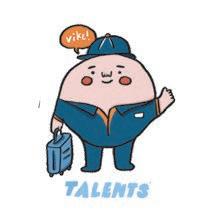
l The HKBN Group joined the government's TOP training scheme for interns that is partnered by HKFYG.
l The for ward-looking telecommunications and technology company has a refreshing and proactive approach to internships, as Manager for Talent Acquisition & Branding Sandy Leung explains.
l She is keen to unleash the potential of the younger generation and accelerate their professional and personal growth.
l 香港寬頻參與由青協推出、由香港特區政府防疫抗疫基 金贊助下創造的就業計劃,計劃名為「資訊及通訊科 技人才培訓計劃」(Telecommunications Opportunities Programme,英文簡稱 TOP)。
l 香港寬頻持股管理人及經理(人才吸納及品牌建立) 梁 可欣女士指出,對具前瞻性的電訊及科技業公司來說, 他們樂意積極提供創新的實習計劃予青年。
l 她期望透過實習計劃幫助青年發揮潛能,並加強他們在 專業及個人範疇的成長。

How does HKBN select and develop its interns?
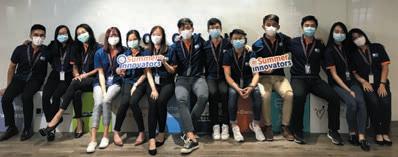
Some might think telecommunications is all about technology, but at HKBN we put our people – or as we call them, “talents”, above all else. This talent-first approach to business is what has driven our capabilities to innovate, even in Hong Kong’s intensively competitive landscape.
Just as we build up our talents over the long term through entrepreneurship, continuous learning and development, as well as life-work priorities, we select our interns not only for their immediate impact but also for their future potential. Our programmes reflect this philosophy, we don’t just hone their “hard” skills with office-based experiences, we add a wide range of real-world exposure, so our interns will be much better equipped than their peers and thrive when faced with future challenges.
What do interns most need when they first arrive at HKBN?
New graduates were facing unprecedented job-hunting challenges from COVID-19 and a prolonged economic downturn, so we wanted to do our part and offer muchneeded support. This is why we launched “#ToughTimesTogether - Career Kickstarter for Graduates”, Career Kickstarter for short. Last year, the programme set trainees off on an exciting three-month career journey with a plethora of opportunities.
What was the focus of the Career Kickstarter programme?
Even under normal circumstances, the gap between university and the practical working world is huge, and the pandemic has only widened the gap further. We provided participants with a place to learn and fail. They also built a two-way mentoring relationship with our top 1% executives whose professional achievements were an inspiration.
Participants started off by choosing the area where they wanted broader exposure. Then, to help kickstart their careers, we matched each placement with three months of on-the-job training and mentorship. They benefited from an insider's look of the operations of a leading integrated telecom and technology solutions provider, from our innovative Barter & Bundle scheme for enterprise customers, building a 5G fibre backhaul for a local mobile network operator, to rolling out of various COVID-relief initiatives for society’s disadvantaged.
15
How many applicants and participants were there in this programme?
We received overwhelming response of over 1,300 applications and finally took 96 young talents who, based on their specialization and aptitude, were placed in different departments and operation units ranging from business analysis, cloud services, corporate and marketing communications, corporate sales, digital transformation, finance, information technology, legal and regulatory, marketing, network technology, operations management, talent engagement and more.
Was the training and mentorship face-to-face or virtual?
We adopted a hybrid model – a mix of face-to-face and virtual training and activities. It included job-shadowing the top 1% of our executive team, taking lead roles in virtual webinars, and organizing networking events. These activities were transformative and gave the young talents valuable know-how to boldly Get Stuff Done (GSD), greatly enhancing their future prospects.
What was the outcome?
While originally conceived as a stepping stone for aspiring young people to develop and grow even in tough times rather than a recruitment drive, we nevertheless offered full-time employment to 25 participants. For those who didn’t stay with HKBN, the three-month practical work experience in a specialized function area was useful and likely to increase their chances of landing a job in future.
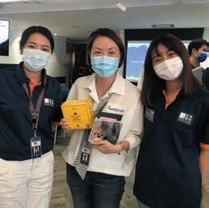
More importantly, the true meaning behind our #ToughTimesTogether campaign was our hope to inspire more companies to step forward and extend a helping hand by being flexible or by doing more. Collective action will make all the difference.
Do you have a regular, annual internship programme?

We organize a yearly “Summer Innovator” programme designed to mould young talents into future leaders. Participants gain a wide range of business exposure, explore initiatives and equip themselves to jump out of their comfort zone onto a purposeful career path.
This programme is all about getting participants excited about what they are doing, see the value in the end goal and live out the saying “the world is constantly changing, but
here and now there are still ways to become the best version of yourself.” Our 2020 programme attracted over 2,500 applicants competing for 13 slots. In 2021, we aim to hire 10-15 Summer Innovators, depending on talent calibre.
How do you select them?
We use a host of factors such as area of interest, mindset, learning agility and exposure. And of course, those who love our unique culture and demonstrate the ability to fit in have a big advantage. For last year’s “Summer Innovator” programme for example, the applications included quality video CVs, many of which stood out by showing the candidate’s determination and proactive mindset. With only 15-20 places every year, our tip for getting past the initial review is to take an audience-IN approach. That means don’t let your CV be just one more among 2,000. Instead, tell us what makes you the best fit for HKBN.
What other tips do you have for young job hunters? Traditional education may box us into a speciality, but in real life you need to adapt and diversify. Everything you do must have a unique and clearly defined edge if it is to make an impact – at HKBN we call this Legal Unfair Competitive Advantage (LUCA). It’s the same when you’re applying for a job – having a LUCA and knowing how to tell people about it will make you stand out from other applicants. Here at HKBN, we love job hunters who stand out from the masses by emphasizing the talents, passion and skillset they can offer, not just how much they like our company. Academic grades are only one criterion we consider. We are looking for street smarts in addition to just book smarts.
What kinds of exposure do your summer interns get?
Young Talents in both our Career Kickstarter and Summer Innovator programmes get opportunities to learn from executives and industry leaders. We had webinars about the gripping journeys of the founders of NGOs such as Mother’s Choice and Room to Read. Face-to-face exchanges were held when they were possible, including with Simon Squibb, serial entrepreneur and angel investor who shared his professional experience and his take on the purpose of life.
March 2021 ∣ Youth Hong Kong Interview 16
There were also opportunities aplenty to learn from our top 1% executives. Our summer interns joined numerous webinars and talks. Our Co-Owner and Executive Vicechairman, William Yeung, gave a virtual sharing about the 5Ps – Prior, Preparation, Prevents, Poor, Performance. Last year, our interns helped organize a Leaders Forum where our Co-Owner and Group Chief Executive Officer, NiQ Lai, as well as George Hongchoy, Executive Director & Chief Executive Officer of Link REIT, Gigi Tung, Founder of Food Angel, and Anthony So, Founder & CEO of OnGrad, shared tips with youths on finding their way.
How do the interns react to your approach?
Despite how some say we are far too demanding and chances of getting in are no better than winning the lottery (therefore not worth the effort), we’ve seen applicants returning for another try after failing to make our shortlist in a previous year.
And for the young Talents who do get selected, we’ve witnessed how they’ve been jolted out of their comfort zones and become indispensable contributors to key projects. Their energy and passion have brought value to our operations and fostered an energetic and positive working environment for the whole company.

Programme participants say…
“Embarking on a journey at HKBN made me more change-ready for an ever-changing world while pursuing a purposeful career, not just a job.”
Aimee Xu, 2020, Translation and Bilingual Communication graduate, Hong Kong Baptist University
“After a great deal of exposure at HKBN, I started a new chapter in my life. From a fresh graduate feeling lost, I become an HKBNer who keeps learning and growing every day.”
Anna Ngan, Social Work and Social Administration graduate, The University of Hong Kong

“


I’ve learnt two things. First, as a programmer, I must ‘change or die’, updating myself with the latest technologies or risking being left behind. Second, I must be proactive and take every opportunity I meet, even if things never go perfectly as planned.”
Suki Wong, 2020 Computer Science graduate from City University of Hong Kong
Ms Sandy Leung joined HKBN in 2016 as an HR professional with extensive experience in talent acquisition, recruitment and marketing in various industries. As an HKBN CoOwner and its Manager for Talent Acquisition & Branding, she recruits talented people from junior to executive levels and leads its internships and trainee programmes.
HKFYG and HKBN collaboration
The Telecommunications Opportunities Programme (TOP), run in partnership with the Commerce and Economic Development Bureau and HKFYG, offers 12-month full-time job opportunities for young people under the HKSAR Government’s Anti-epidemic Fund. HKBN and HKFYG have joined hands to drive this initiative forward. Young participants gain actual work experience, develop their ability in particular areas, hone mindsets so that they are equipped to be more competitive.

17
“Participants will experience HKBN's unique culture and see how we put values such as entrepreneurship, disruptive innovation, continuous learning and life-work priorities into practice for success.”
Support for interns
l Government job training schemes aim to boost young people's employment opportunities.

l TOP, administered by HKFYG, is for youth wanting careers in telecoms.
l Some of the other government job skills programmes are designed for GBA placements.
l 香港特區政府的實習計劃旨在提升青年的就業機會。
l 香港青年協會推出的「資訊及通訊科技人才培訓計劃」 (Telecommunications Opportunities Programme,英文 簡 稱TOP)專為有志投身電訊業的青年提供寶貴的機會。
l 同時,政府亦提供一連串專為大灣區實習而設的就業技 能培訓計劃。
Young people’s career prospects have been badly affected by the pandemic and they need as much support as they can get. Mr Edward Yau, Secretary for Commerce and Economic Development of Hong Kong, explains why he hopes youth will draw encouragement from a new initiative launched under the Job Creation Scheme of the Anti-epidemic Fund. The Commerce and Economic Development Bureau (CEDB) scheme embraces two programmes. First, the Telecommunications Opportunities Programme (TOP), which is creating 100 full-time job opportunities with HKFYG. Read about examples in the preceding interview.
When asked why the creative industries had come into the limelight in the Future International Talent (FIT) programme, Mr Yau refers to the involvement of 11 Hong Kong chambers of commerce. They are working with locally-based companies to offer over 100 full-time internship positions with priority given to the creative industries.
“While the programme is not sector-specific, we accord priority to our creative industries, namely, advertising, architecture, design, digital entertainment, film, music, printing and publishing, and television.” These are one of the Hong Kong government’s key economic pillars. “They are important for enriching the diversity of Hong Kong’s economy and many recent graduates aspire to careers in this sector.”
Applications for the internships have already begun and the CEDB’s website is listing job ads. As Mr Yau adds, “The employers will also conduct their own recruitment exercises. They are required to make an employment offer within three months of approval of applications.”
Asked about the format and content of the attachments, Mr Yau goes on to say, “For FIT, we anticipate there will be a variety of vacancies for young people.” Employers will provide on-the-job training that contributes to long-term
career development. For TOP, employers are also providing a wide range of vacancies including software programmers, assistant engineers, and sales and marketing trainees.”
Beneficial outcomes are expected to continue even though the programme’s subsidies will cease after a maximum of 12 months for each job position. Nevertheless, Mr Yau assures, employers joining the programmes are encouraged to continue employment of the young participants, thereby “providing much-needed job opportunities for our young people at this difficult time.”
“FIT offers global perspectives and wider exposure to young people through work, in particular those who aspire to pursue careers in the creative industries,” he concludes. “For TOP, working and training opportunities in the promising era of 5G telecommunications will help to equip employees with lifelong skill sets for career development.”
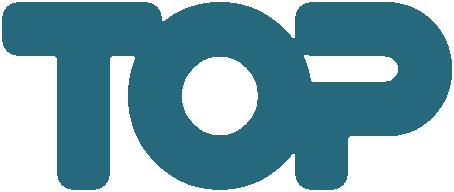
Mr Edward Yau has more than 30 years of public administration experience and was Secretary for the Environment from 2007 to 2012 then Director of the Chief Executive's Office of Hong Kong before becoming Secretary for Commerce and Economic Development.

March 2021 ∣ Youth Hong Kong Interview 18
Telecommunications Opportunities Programme (TOP)
This job-creation scheme dedicated to the telecommunications industry was commissioned by the CEDB and is being administered by HKFYG.
Aim Under the umbrella of the HKSAR Government’s Anti-epidemic Fund, its aim is to create 12-month full-time jobs for young people in the telecommunications sector. TOP will make young people more competitive as well as enhancing their employability and nurturing talented youth for the industry.
Eligibility
Applicants joining TOP should be:
• HKSAR residents aged 18 or above holding valid Hong Kong Identity Cards
• Holders of accredited certificates, diplomas, degrees obtained in programmes of post-secondary and tertiary institutes, or have relevant work experience in the telecommunications industry
• Fresh graduates in 2020 or 2021 with no work experience, or young people with a maximum of five years’ work experience
TOP participant employers currently include:
• China Mobile Hong Kong Company Limited
• CITIC Telecom International Holdings Limited
• GOIP Aula Limited
• HGC Global Communications Limited
• Hong Kong Broadband Network Limited
• Hong Kong Communications Company Limited
• HKT Services Limited
• Huawei (Manpower)
• Hutchison Telecommunications (Hong Kong) Limited
• Multibyte Info Technology Limited
• SmarTone Telecommunications Limited
• WiseSpot Company Limited
… check them all out here:
Over 120 job opportunities for young people, including:
• Systems Analyst
• Digital Commerce Executive
• Junior Software Developer
“FIT” Future International Talent
Join TOP yen.hkfyg.org.hk/top
A joint initiative of the Commerce and Economic Development Bureau (CEDB) and 11 international chambers of commerce in Hong Kong. Offering 12-month job placements to fresh and recent graduates in Hong Kong with priority given to the creative industries or creative roles in other industries.

Partnered by:
• American Chamber of Commerce in Hong Kong
• Australian Chamber of Commerce in Hong Kong
• British Chamber of Commerce in Hong Kong
• Canadian Chamber of Commerce in Hong Kong
• Dutch Chamber of Commerce in Hong Kong
• French Chamber of Commerce and Industry in Hong Kong
• German Chamber of Commerce in Hong Kong
• Italian Chamber of Commerce in Hong Kong and Macao
• Hong Kong Japanese Chamber in Hong Kong
• Swedish Chamber of Commerce in Hong Kong
• Swiss Chamber of Commerce in Hong Kong
Funded Under the Job Creation Scheme by the Anti-epidemic Fund More details cedb.gov.hk/en/tools-and-funding/future-international-talent.html
19
Greater Bay Area Youth Employment Scheme
January this year saw the launch of the Greater Bay Area Youth Employment Scheme announced by the Chief Executive in the 2020 Policy Address. Supported by the governments of Guangdong Province and the Shenzhen Municipality, it aims to encourage young people to work and pursue careers in the cities of the Guangdong-Hong KongMacao Greater Bay Area (GBA), understand more about the latest developments in Hong Kong and the GBA cities and leverage opportunities for career advancement in the GBA. Graduates employed for up to 18 months under the scheme will receive a monthly salary of no less than HK$18,000 including a government monthly allowance of HK$10,000.
The scheme provides 2,000 places, around 700 of which are designated for innovation and technology posts. Eligible graduates for IT posts should have degrees related to science, technology, engineering or mathematics and they should work in both Hong Kong and GBA Mainland cities, with each location taking up six to 12 months.
The scheme takes into account Hong Kong's economy and market scale and the fact that the youth unemployment rate in Hong Kong may remain in double digits for some time. The GBA, on the other hand, offers many career development opportunities for the young people of Hong Kong. Under the scheme, enterprises with operations in Hong Kong and GBA Mainland cities are welcome to join the scheme and offer job vacancies to eligible graduates under Hong Kong laws. They will work in mainland GBA cities and receive on-the-job training.
More details https://www.info.gov.hk/gia/general/202101/08/P2021010700723.htm
Read more Youth Hong Kong, June 2019 issue: GBA Living, Working, Commuting

Funding Scheme for Youth Internship in mainland China
The HKSAR Government launched the Funding Scheme for Youth Internship in the Mainland in 2014-15 to provide sponsorship to nongovernmental organisations (NGOs) to organize internship programmes in mainland China. The scheme aims to enable Hong Kong young people to a gain deeper understanding of the labour market, work culture and career prospects there. It also aims to help them formulate career goals, gain more work experience and establish interpersonal networks, thereby enhancing their competitiveness in employment in the future.
More details bayarea.gov.hk/en/opportunities/youth.html
Post-Secondary Student Summer Internship Programme in Hong Kong
The 2021 programme, already launched, provides internship placement opportunities for students who are permanent residents of the HKSAR or the People’s Republic of China and enrolled in full-time accredited post-secondary programmes offered by post-secondary institutions in or outside Hong Kong.
Internship placement opportunities are advertised by bureau and departments on their respective departmental websites and the Civil Service Bureau's website.
More details csb.gov.hk/english/admin/appoint/782.html
20 Interview March 2021 ∣ Youth Hong Kong
Powering up matching needs
l The past 12 months have been very tough on young people looking for work and have also had a very significant impact on employers.
l Ms Quince Chong of CLP explains how the company has responded to the situation by efforts to match up its internship programmes to the demand for job training.
l She says potential applicants in this very competitive field should be hardworking and excited about taking on new challenges but also have good communication and interpersonal skills.
How has CLP's internship programme grown?

The programme was established in 1998 offering full-time hands-on work experience to university students. It covers a wide range of project scopes for students in different study disciplines. They work with dedicated mentors and experienced subject professionals, acquiring new skills and abilities that enhance their profiles.
l 過去12個月對求職的青年來說十分艱 難,也為僱主帶來長遠影響。
l 中華電力企業發展總裁莊偉茵女士向讀 者介紹中電如何藉提供適切的實習計 劃,回應青年對在職訓練的需求。
l 她期望申請者努力工作、樂於接受挑戰, 並具備優良溝通協作能力。
The programme is split into different parts. One is for summer interns and another is a 12-month sandwich programme. The aim is to create a win-win-win situation that benefits the students, the universities and CLP by building long-term partnerships. We identify and nurture young, talented people who work on specific projects, gaining valuable and practical experience as well as great sense of achievement.

21
CLP has many different internship projects. How do you decide on the subject areas?
We need subject specialists from different disciplines and subject areas, including both engineering and nonengineering. All the internship projects reflect our business operation needs. Interns are assigned to specific welldesigned projects with clear project outlines. These state the business objectives, project deliverables and learning outcomes. Students can access this information when applying for our internship programme.
How popular are the subject areas with applicants, eg nuclear power, sustainability, mechanical engineering and energy engineering?
We receive a large number of applications every year. Among the applications received in 2020, the top five project choices made by students were Mechanical and Electrical Engineering, Finance, Human Resources and Information Technology.
In which ways did the CLP programme change in 2020 to cope with the pandemic?
The COVID-19 outbreak has seriously impacted Hong Kong’s economy and CLP understands how uncertain young people may feel about the future and the difficulties they may face when entering the job market.

We launched a new CLP Graduate Internship Programme, as well as those mentioned above to try to meet needs. It offers 60 one-year practical work and internship opportunities for 2020 fresh graduates. These internships help the young people understand the power industry better, gain practical experience. The types of jobs include not only engineering, but also positions in environmental affairs, information technology, sales and marketing etc.
Were you able to increase the number of internships?
Yes, we increased the number of internship openings for undergraduates in 2020, allowing more youngsters to scale up their working experience and get prepared for career journeys even amid the pandemic. A total of 123 openings for 59 sandwich interns and 64 summer interns were offered in 2020 whereas there was only a total of 108 openings in 2019.
Together with the new CLP Graduate Internship Programme, and our other regular trainee programmes, a total of around 130 positions have been offered to fresh graduates and graduate students in 2020, more than double the total for 2019.
Have you been able to go ahead with plans for internships in the Greater Bay Area?
Yes, despite the pandemic, we are able to offer six vacancies in 2021 in our China Business Unit for the Greater Bay Area (GBA) Youth Employment Scheme organized by the HKSAR Government.
To encourage and support young people’s work and careers in mainland cities of the Greater Bay Area, there have also been job opportunities for university graduates from 2019 to 2021 for 18 months. The jobs cover several functions such as Asset Management (Renewable), Commercial, Finance, Health, Safety, Security and Environment, Human Resources and Information Technology.
How did you and the interns manage social distancing?
To minimize the risk of infection, CLP adopts different arrangements for both the recruitment process and the working mode of internships while closely monitoring the situation. For instance, recruitment interviews are
22 March 2021 ∣ Youth Hong Kong Interview
We utilize digital platforms for collaboration and provide necessary laptop devices for interns during work from home mode.
We need employees who are excited about taking on new challenges and who want to keep learning, growing and equipping themselves.
conducted via virtual meetings. For the working mode, we utilize digital platforms for collaboration and provide necessary laptop devices for interns during work from home mode.
In the GBA Youth Employment Scheme, we allow the graduates to immerse themselves online. They will be given learning opportunities and engagements with our company that provide them with excellent exposure and experience throughout the 18-month scheme.
What are your top priorities when selecting students or graduates for internships?
Apart from the basic requirements of being hardworking, diligent, proactive and detail-oriented, we also need employees who are excited about taking on new challenges and who want to keep learning, growing and equipping themselves to master the latest technology.
Nowadays, science and technology are developing at a rapid pace and in the changing economic environment we also look for new joiners who have good communication and interpersonal skills, love working with others to solve problems, who are innovative and have both an open mindset and the desire to make a difference.
We hope that our employees will be passionate about the power industry and be proud of serving people, improving their quality of life and promoting social development. In view of the professionalism of electric power engineering and the importance of safety, we also expect employees to have high safety awareness and alertness, willingness to work as a team, and ability to follow the rules and guidelines laid down by the company.
For our GBA Youth Employment Scheme, we welcome interested applicants to get exposure to work and live in the GBA. They should be intellectually curious, innovative and adaptive to different cultures and working styles. They also need to be able to think out of the box with strong problem-solving and communication capabilities.
Do you liaise with universities or do you also receive enquiries directly from students?
Besides putting advertisements on recruitment platforms, CLP’s webpage and social media, we also work closely with the local universities to promote the local internship programme. For the GBA Youth Employment Scheme,
advertisements can be found on the GBA Youth Employment Scheme website managed by Labour Department. Students are also welcome to contact us directly with any enquiries about internships
How many of your summer and sandwich interns, respectively, are subsequently hired?
Around 30 full-time staff who had previous internship experience at CLP joined us in the last five years. 90% of them are currently working under Power Systems and Generation Business Groups and over 65% are now our Engineers II and Assistant Engineers.
What initiatives do you have in mind for future?
CLP aspires to become the “Utility of the Future” focusing on innovation, decarbonisation and digitalization. We are inviting young talents to be part of our workforce to join this exciting transformation journey. By offering various opportunities, we continue to support students in embracing change and nurturing a people-centric innovation culture.
For CLP, diversity is a business focus. We hope to attract the best talent from the widest possible candidate pool. We value and respect differences, encourage everyone’s participation and are open to ideas, issues and concerns raised by anyone. We believe that the new ideas and perspectives needed to transform our business in future will come from diverse teams, working together.
Ms Quince Chong, JP, is the Chief Corporate Development Officer at CLP Power HK Ltd


23
The top five project choices made by students were mechanical and electrical engineering, finance, human resources and information technology.
Virtual internships
l Two young professionals offer views on the transformation of today's internships.
l Their insight comes from personal experience and working on an HKFYG survey on this topic.
l Upbeat about the growth of virtual internship, they foresee this mode taking the lead in shaping job skills to come.

An opportunity to treasure
COVID-19 has changed the landscape of a traditional internship. The old model has become unviable and a shift to the virtual or hybrid mode has taken place while companies accelerated digitalization. Meanwhile, the downturn in the economy has created even more difficulties for students who wanted to find internships.
In such an environment, virtual internship allowed flexibility. It meant that employers who could change their mode of operating could still offer internships and prospective employees could gain valuable work experience. Nevertheless, according to statistics from JIJIS,* there was a sharp decrease in positions available in the first four months of 2020 with 30% fewer internships being offered compared to previous years.
Opportunities for internship should be treasured as an important element of education and acquaint themselves with a work environment. According to our report, the motivation of about half of all university students who wanted to be interns last year rested on the chance to understand workspace culture, enrich their CVs or apply what they had learned to a job.
Internship is an important learning milestone that connects the campus world of student life to the external world of industry. Nevertheless professions such as nursing that require a direct and frequent human touch as well as hands-on practical experience, virtual internship has marked shortcomings. According to speech therapists who took part in our survey, the virtual mode of the internship is less suitable. If there is only online interaction it can be very difficult to calm down and teach a child.
l 兩位青協青年創研庫成員,具備專業背景,分 享他們對實習的看法。
l 透過自身經驗,以及總結香港青年協會的研究 結果,他們帶出了對這個課題更深層的理解。
l 他們認為虛擬實習將成為主流,並主導未來工 作技能的轉變。

However, in spite of such limitations, I think virtual internships are here to stay. They mean there is still a feasible option and I believe that the hybrid model of a combined offline + online internship will be the trend in the future workplace and giving students who want an overseas internship the chance to do one without travelling.
Dan Cheung is a social innovation consultant. He has been an intern in a Hong Kong museum and a global youth organization. These positions involved international marketing, guest coordination and programme development. The experience he gained during the internships empowered him to connect with the global community.

…an important learning milestone that connects the campus world of student life to the external world of industry …
* JIJIS (Joint Institutions Job Information System) is a platform for employers and university students that is offered jointly by University Grants Committee-funded universities in Hong Kong.
24 March 2021 ∣ Youth Hong Kong Perspectives
Dan Cheung
The flexibility quotient

Youth unemployment is a worldwide phenomenon and many youngsters find it difficult to make the transition from school to work. As technological advancement has taken place, the labour market has been reshaped into one which is more cost-conscious and more volatile than in the past. It is knowledge-based and constantly changing. Young people, especially the underprivileged who have less work experience, job skills and access to career advice, are most vulnerable.
Internship experience is of paramount importance to them. It provides invaluable opportunities to gain practical work experience. As interns, they will also equip themselves with the necessary transferable skills, build and extend professional networks and achieve selfactualization by exploring their talents and potential.
The most important outcomes of an internship for careers are dependent on a number of factors. First, their effectiveness in giving youngsters the chance to explore their real interests and talents. Second, the level to which they enable an understanding of working culture. Third, how well they allow young people to develop important skills that will be relevant to their future career paths or options.
Most youngsters are usually concerned that virtual internships will offer less chance to experience workplace conditions, that they are ineffective as a way to communicate, and that they involve fewer resources which in turn lead to fewer learning opportunities. However, I believe that their experience will not necessarily be seriously affected by the mode of an internship.

On the other hand, I think that virtual internships mean greater flexibility which in turn means that students can balance school work and job-related duties irrespective of where they are or the time of day. As a result, young people can consider overseas internships regardless of geographical and physical barriers. In fact, virtual internship will become a new norm in future.
To make a virtual internship a good experience, it is important that corporate employers provide mentorship or buddy schemes, that they maintain regular contact with interns and

work according to a detailed schedule and plan. With these parameters in place, youngsters can also gain excellent realworld training to no less an extent than they would through conventional internships. During my work* on a virtual internship programme, I have seen this mode gaining in popularity as a great alternative. It not only motivates youngsters to face new challenges by equipping themselves future skills but also empowers employers to nurture and recruit young talents.”
Kiu Cheng is a barrister, and a member of the Commission on Children and HKFYG’s Youth Service Advisory Committee. As an intern, she learned to apply technical legal knowledge to practical situations. She works with Foster Worldwide on a virtual global internship programme that helps thousands of young people intern with companies in over 60 countries.
These two writers contributed to HKFYG’s Youth I.D.E.A.S recent report on internship. Dan is the convenor of the think tank’s Education Group. Details on page 48 and at yrc.hkfyg.org.hk/2020/11/30/yi055/
It is important that corporate employers provide mentorship or buddy schemes, that they maintain regular contact with interns and work according to a detailed schedule and plan.
25
Kiu Cheng
Reflecting on prospects
l Talented students win Innovation & Technology Scholarships in an HKFYG award scheme.
l It supports internships and attachments with mentorships.
l Three awardees explain how the scholarships have helped them.
l 創新科技獎學金旨在嘉許別具創科才能的學生,提供 學習機會及回饋平台。
l 計劃同時提供實習和導師指導支援。
l 三位得獎青年分享這個獎學金如何協助他們發展所 長。
Shadowing frontier researchers
All through my undergraduate years at HKUST, I have been a diehard tracker of cancer biology. This passion stems from a very personal experience. I witnessed a family member suffering from pharyngeal cancer a couple of years ago. He was my grandfather and his cancer was terminal. This diagnosis was a hard blow to my family. With an obstructed throat, he struggled to move, speak or even swallow and was bedbound in his last days.
Cancer is exasperating, not only because of the pain it causes but because of its incurable nature – became determined to dedicate myself to cancer research. Understanding cancer takes much painstaking effort even before one can start to think of eradicating it. In a bid to be better prepared, I ventured out of my comfort zone and faced unfamiliar, challenging environments while taking every opportunity I could to exchange of ideas with brilliant researchers in the field.
In the first three months of 2020, I did an internship at the Tokyo Metropolitan Institute of Medical Science under the supervision of Professor Hisao Masai. It was a thoughtprovoking experience, working on replication patterns, a relatively little-explored field where there is speculation about the connection with human genome integrity.
In Hong Kong, I was very fortunate to have the opportunity to be a mentee of Professor Gabriel Leung, Dean of Medicine at the HKU Faculty of Medicine. I also interned
at Professor Alan Wong’s lab in the HKU Department of Medicine in summer 2019. It was an honour to talk to Professor Leung. We discussed the obligations of researchers as well as Hong Kong. He never lacked for inspiring questions to put to me, making me reflect on my prospects and direction in life. The HKU lab experience also allowed me to shadow frontier researchers in synthetic biology projects, a fast-emerging field unfamiliar to me.
I hope to be a researcher myself in future and am looking for internship opportunities with pharmaceutical companies to learn about the industry, rather different from my familiar academic environment. I would like to help solve real-life problems and hope to polish skills that will make me a better researcher.

The Innovation and Technology Scholarship supported my attachments and internships financially but also gave me the opportunity to meet scholarship awardees from overseas. By exchanging ideas with them, possibilities opened up in new directions.
Peter Fu Wai-kuen is studying Biochemistry and Biology at the Hong Kong University of Science and Technology
 Peter Fu
Peter Fu
March 2021 ∣ Youth Hong Kong Perspectives
26
I am looking for internships with pharmaceutical companies and would like to solve real life problems.
Ever since childhood, I have enjoyed using technology to design and create things like birthday cards for my friends and websites for my family. The older I grew, the more I realized how code and algorithms can empower society for the greater good. That’s why I chose computer science as my major at university.

The overseas attachments I did with the support of the Innovation & Technology Scholarship took me to Japan in 2019-2020. I looked for experiential learning activities that are rare in Hong Kong. At the Rakuten Technology Conference, for example, and l learned about the latest frontend technologies directly from their developers.
Mr Raymond Cheng, Group General Manager & Chief Operating Officer of HSBC Asia Pacific, has been my mentor under the scholarship scheme. He has given me his advice on career goals and shared with me his personal experience of doing a final year project as a university student. By listening to his story. I have learnt that being skilled in technology is not about mastering coding languages but about equipping oneself with the ability to adapt quickly to the latest trends.
l learned about the latest frontend technologies directly from their developers.
I also took part in workshops and competitions in space technology and was fascinated by the satellite missions I learned about at the University of Tokyo. With a team of local students majoring in aerospace engineering, I entered the International Satellite Design Contest hosted by The Japan Aerospace Exploration Agency. Our design for a lunar rover mission won us the Grand Prize in the Idea Section as well as the Astronomical Society of Japan Prize. All these experiences reinforced my enthusiasm for computer science and helped me to define my career goals.
In addition, I took an Aviation Business Project Course coorganized by the University of Tokyo and Airbus Japan and did an Airbus Japan Business Project. The course syllabus included the use of cost models to estimate airline company finances.
My next internship will help me to decide what to do upon graduation. Ideally, I want to sharpen my skills in designing and testing software for industrial use.
In future, I anticipate taking a software engineeringrelated role in Hong Kong that allows me to come up with innovative solutions based on clients’ business requirements. Still, I look forward to having the chance to explore overseas career options and I hope the chance will come again to collaborate with professionals across the globe when international travel is possible.
Angel Woo Chung-yu is studying Engineering in Computer Science at the University of Hong Kong
 More than mastering coding Angel Woo
More than mastering coding Angel Woo
27
Combining the elements
l The advice of a wise mentor and a fruitful exchange at the University of Liverpool complemented his experience.
l As a talented electronic engineer, he discovered important elements of excellent preparation for a bright future career.
I chose Liverpool for my overseas exchange because the university is famous for electrical and electronic engineering. Initially, my studies were mainly related to digital and wireless communication systems. I learnt about communication systems all the way from the 19th to the 21st centuries.
5G technology is now trending, but one of the professors, Dr Xu Zhu, explained how it is still unfeasible and incompatible with many environments, being too complex and too costly. The challenges involved in making 5G more widely available have encouraged me to do further research in this area, including even the latest 6G.
Learning practical skills is one of the main objectives of the university, as well as learning theory. Data processing and image processing both require the skills of software building and programming and by learning programming languages like MATLAB at Liverpool I made big improvements to both my practical skills and knowledge. So much so, that I am now confident that my programming skills can be applied in any future research and work environment.
I also had the pleasure to learn from experts during the courses on signal processing and data structure that followed. This was fundamental to my onward
Michael Leung
l 梁同學分享他在通用電氣實習的經驗,坦言機會 難得。
l 他在利物浦大學交流期間,獲頂尖導師指導,豐 富了他的交流經驗和眼界。
l 梁同學是極具潛力的電子工程師,他在學習期間, 了解到如何為未來工作作出更佳準備。
studies because signal processing provides the theory and principles behind today’s technology while data structure provides knowledge of software building.

Throughout the scholarship, Dr Roy Chung Chi-ping, GBS, JP, was my mentor. He is a successful businessman in the field of engineering who taught me a great deal. He explained how students nowadays don’t know enough before they choose a subject for research. Many of them just want to continue studying to avoid working straight after graduation, or they are encouraged by parents and teachers who see good academic results and think their children should go on to do a higher degree.
Such straight talk felt like a punch in the gut to me at first, but actually Dr Chung was presenting me with a key to success. That key opened a window through which I could see that although I was interested in various fields of research, my experience and knowledge in any specific field was insufficient for choosing between them. I also realized that if I wanted to innovate in modern technology, I first needed to gain experience in the business world and learn about society’s needs. Then, I could decide on the area where further research was required and make a valuable contribution.
l Our third scholarship -winner is Michael Leung who did an internship with General Electric.
March 2021 ∣ Youth Hong Kong Perspectives 28
I am now confident that my programming skills can be applied in any future research and work environment.
I started looking for companies in telecommunication and signal processing and did a two-month internship with the General Electric [GE] in Hong Kong from July 2019 to September 2019. It was very rewarding, not only because it introduced me to an interesting field but also because I could immerse myself in a real business environment while gaining practical skills.


After training, I was assigned a job doing promotional and demonstration work for Smart Eyewear, the company’s newly acquired product. Smart Eyewear consists of a camera, a small monitor, and a speaker that allows you to communicate with others handsfree. I had to write a product brief and give demonstrations, so I learnt a lot about promotion and how to collaborate with my colleagues on the job.
Although it was just a short project, I gained both business and presentation skills and that inspired me to find out more about creating a practical and efficient electronic product with both social and industrial uses. The eyewear is being used by maintenance workers. It allows better collaboration with experts overseas. Moreover, the eyewear could also be used in other sectors as it allows people to work remotely.
GE also gave me tasks directly related to my study field, such as making up an Excel table to log the logic gate of
one of their gas-insulated switchgears. During the process, I learned about the logic behind a real disconnector and a circuit breaker, an amazing combination of electronics and electrical gears. I also learned a lot from the people at GE and had the chance to meet a world-renowned expert in the UHV networks field of electrical engineering, Denis Dufournet. Overall, this internship gave me confidence and skill.
The experience and knowledge I have gained as a result of the scholarship have truly inspired me to pursue a career innovation and technology. The precious opportunities it provided have not only supported me financially but have broadened my horizons. They have deepened my appreciation of my chosen field of study while my inspiring mentor has taught me much about a successful career.
Michael Leung Ho-man will graduate from the Chinese University of Hong Kong this year.
29
I could immerse myself in a real business environment while gaining practical skills.
The biggest risk is regret
l Social entrepreneurship is at the forefront of the vision of Francis Ngai.
l Here, he talks about his work with young people and reshaping Hong Kong as a model.
l He says that at SVhk, a measure of success is building consistent, sustainable habits.


Social Ventures Hong Kong (SVhk) began as an incubator for social enterprises ten years ago but coping with the challenges of 2020 has demanded both flexibility and fortitude. Francis Ngai, the enthusiastic co-founder of SVhk, explains how the organization has evolved into a social impact organization. “Our focus now is rebuilding a sense of purpose and maintaining momentum in the face of the realities of capitalism.”
The goal of SVhk is to reshape Hong Kong as a model for future global cities. Delving more deeply into the meaning behind this vision, Francis explains that “Through collective action, innovation can transform Hong Kong’s current social and environmental challenges into a positive force for growth.”
l 梁魏華星先生是本港社會企業的創新先驅。
l 他分享如何跟青年合作的一些案例,攜手為香港未來 努力。
l 從香港社會創投基金(SVhk)的角度而言,建立一 致及持續的習慣是衡量成功的關鍵。
Francis is sympathetic to young people who feel depressed and frustrated after the protests and the pandemic but is inspiringly optimistic about the city’s future, despite the status quo.
“At SVhk, we don’t measure success by funding or investment,” Francis stresses. “We use indirect metrics such as the effectiveness of our message, success in shifting mindsets and building consistent, sustainable habits.” Using Green Monday, a social venture he co-founded, as an example, Francis points out the breakthrough of getting Omnipork, a vegan product made from mushrooms, peas and soya, onto menus at MacDonald’s.
Green Monday has expanded throughout southeast Asia and into mainland China but establishing the company as a pilot
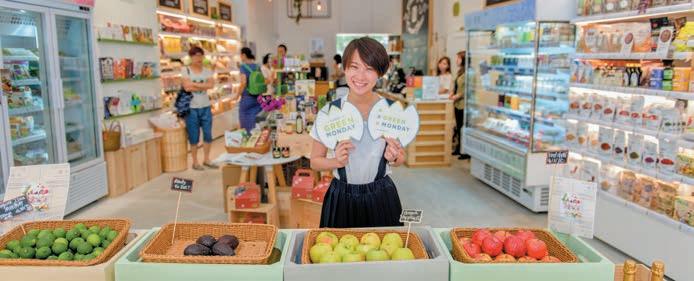
Photographs on pages 30-31 courtesy of SVhk March 2021 ∣ Youth Hong Kong Perspectives 30
project in Hong Kong was the most important first step, says Francis, and he maintains that “Timing may not be right for setting up a social enterprise in the mainland. It’s a question of marketing and seeing what people like and want. I would say that Hong Kong has a big enough market for everyone to realize their dreams here. If you live in Hong Kong, this is where your heart lies.”
Light Be is another innovative social venture supported by SVhk. It supports residents of cramped sub-divided flats by arranging for them to move into property provided by philanthropic landlords. “With other families in a co-living environment, they share more space at affordable rents. The goal is to give these families hope of a better future but also to rebuild trust within communities.” More than 400 families have been rehoused in this way. “Being poor is not just about lacking money, it is also about lacking aspirations. Money cannot solve all problems. Finding solutions is all about people.”
Hatch, a co-working factory of six enterprises is another example. “It’s reviving a Made in Hong Kong culture,” says Francis. It empowers women with jobs, “but it’s not just about earnings, it’s about having hope and taking heart.” A community resilience loan fund has been set up for similar social enterprises and SVhk is looking for more. “We are trying to get young people to take their ideas for startups from conceptualization to actualization with social purpose.”
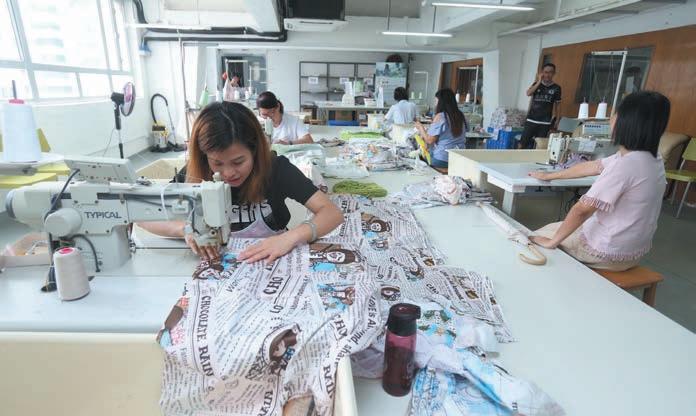
Coming up next at SVhk is a forward-looking transformative journey called “New Urban 2030”. Each year it adopts an iconic Chinese character to reflect a focal concept. For 2020, the character means rest, reflect and reset after a difficult, unrestful year. For 2021, the multifold concept is transformation with adaptability, resilience and being capable at heart.
“People think that setting up a business is risky, especially now,” Francis concludes but, “Our biggest risk is regret. We can’t wait for an official change to our system and so we call on all Hongkongers to dare to reimagine, to redefine their urban lifestyles and ecosystems. We want to see returns and we can’t use old metrics to measure progress. By using hope and optimism as a measure, we can redefine success, make Hong Kong a model despite economic downturn and become proud of our city again, not only by surviving but by thriving.”
Francis Ngai is the founder of SVhk, a venture philanthropy organization. SVhk is a venture philanthropy organization that supports innovative for-profit social enterprises in Hong Kong.
More details sv-hk.org/
 Hatch, a co-working factory, one of SVhk's social enterprises.
Hatch, a co-working factory, one of SVhk's social enterprises.
31
Hong Kong has a big enough market to realize your dreams here.
Focusing on social impact
The H KFYG Inno Impact Project
In challenging times like this, we need to be agile, innovative and embrace change warmly. That’s why the HKFYG Inno Impact Project stimulates young people in their 20s and 30s to respond to society’s needs.
The HKFYG Innovation for Social Impact Project

(HKFYG Inno Impact) was launched on the occasion of the 60th Anniversary of The Hong Kong Federation of Youth Groups. It allocates resources that recognize and celebrate young people who use creativity and innovativeness to solve issues that confront Hong Kong. Award winners create social value by applying their ideas while working towards the common good of improving society.
Target Young people aged 18 to 35 who found startups and medium, small or micro-enterprises including social entrepreneurs, professionals, the self-employed and students.
Objective To identify and pilot promising, solutionbased plans and actions that approach problems and issues of concern within the community in a new, creative way. The aim is also to encourage young people to use their potential for giving back to the community through their actions, building civic responsibility, and thereby helping to create a caring community with social value and a return on investment.
HKFYG Inno Impact Awards Each award is valued up to HK$200,000 and includes professional mentorship, guidance, introduction to networks and service promotion.
Meet the finalists
Flowclass finding tutors for special needs
Ivan Wong, in his final year of a degree in Global Business Studies at the Chinese University of Hong Kong, has devised a proposal with four team mates to help special needs (SEN) students who need private tutoring.
“The proportion of SEN students in Hong Kong tripled from 2.5% to 8.8% in the past ten years. Their parents have to knock on the doors of thousands of tutorial centres and NGOs to find suitable tutoring services. We want to create a SEN tutoring ecosystem in Hong Kong that will change all that.
With Flowclass, they can look for tutors with the tag ‘SEN Education.’ It saves weeks of aimless searching. We also want to develop AI that asks a series of interactive guiding questions that will help them choose the most suitable service provider.
I believe every student deserves personalized lessons and after my DSE exams, many schoolmates told me that they were under immense pressure and had very limited support at school. Now, as a social entrepreneur, I want to support them and taking part in this competition has allowed me and my team to think more deeply about putting our ideas into practice and then implementing them outside schools.”
March 2021 ∣ Youth Hong Kong HKFYG 32
Yanice Mak went to the Chinese University of Hong Kong and Boston University. Now she and her partners have designed an internship placement service for young people.
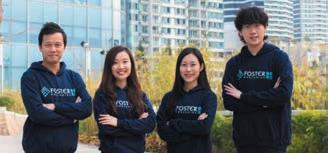
“We believe that education can change lives and our mission is to foster the next generation of young global leaders by providing quality career education and virtual global internships. We have launched the first-ever virtual global internship programme in Hong Kong and can offer overseas internships, online vocational training and career guidance.
With us, talented youth can extend networks and improve both their employability and social mobility. Underprivileged students with outstanding performance will receive scholarships. We also support schools and NGOs that provide career education and life planning advice as well as placement opportunities and aim to reduce teachers’ heavy workload. Corporate partners use our services for recruitment and thereby help empower young people. Most importantly, we hope to bring change to the world through collective effort.”
Lighten Dementia engaging local seniors
Christine Chan, a teacher, with her designer team mates, Ryan Cheng and William Chan and four others, help elderly people with dementia and their caregivers.
“Ryan realized during his internship at a local elderly centre how difficult it is to find appropriate cognitive training products. Usually, social workers have to use worksheets, children’s toys or overseas products but they are unsuitable for Asian people and fail to engage them effectively.
So we started designing and producing resources relevant to Hong Kong. We want to offer a fun, interactive gamebased cognitive training. Service-learning for tertiary students that builds understanding of dementia issues and fosters intergenerational harmony is another goal. It is very satisfying to see happy faces at the elderly centres and the positive comments are a great encouragement.

Prof Leung Chi-hung of the Education University, an expert in therapeutic play advised us and helped to establish the research foundations for our compassionate project.”
Andy Wong has a degree in English and ten years’ experience in technology and operations with international firms such as Manulife and UBS. His team members also have varied backgrounds in areas such as accounting, engineering, risk analysis and AI.

“Wellbeing and stability are essential to everyone’s daily lives and we are all at risk during floods. We have been monitoring the problems and want to find long-lasting solutions.
After the rainstorm in June 2020 and other flash floods, we decided to learn more about blocked drains and prevention of flooding that creates a lot of damage and – in extreme cases – even death.
Our plan is to install stormwater drain filters in high-risk flood zones that reduce drain blockages, hazards to the public and potential damage to goods and property We can also offer both voluntary work opportunities and part-time jobs with minimal technical requirements. Lessons for younger children in avoiding blocking drains with plastic bags and an education outreach programme are all part of our commitment. Safety and sustainability are central to our vision.”
Foster Worldwide offering virtual internships
Project Drain preventing floods 33
Leung Kwan Cheung, a graduate in electronic engineering, has devised an ed-tech solution with his team members. It helps young students master the concept of AI and coding.
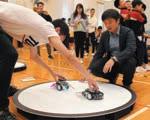

“Doing an internship with a fintech company in Beijing inspired me to become a social entrepreneur. The experience taught me what it is like to run a startup company. Most importantly, I learned the lesson that if you discover a problem, you should try to solve it by creating your own solution.
There are many educational STEM tools on the market but none of them helps students understand AI with a step-by-step approach. That’s what TEE. AI does. It centres on block-based data analysis and AI machine learning. It’s a solution for teachers and is suitable for Hong Kong students from Primary 3 to Secondary 3 who are willing to learn useful skills rather than play with robots and toys. Reaching the finals of the HKFYG Inno Impact Project has given us great encouragement the motivation to keep going.”
翻轉網上教室 學 STEM 人人都得 tailor-made for children
Harry Leung, with partners, Zoe, Tony, Darren, want to do something meaningful for Hong Kong schoolchildren.

“Every young child should have the opportunity to study STEM subjects. Our main target groups are primary school students but we are also reaching out to tertiary students who plan to become teachers. We want to provide them with the chance to experience teaching STEM.
When I was in a junior class at secondary school, some senior students inspired me. They told me about their creative work and were always willing to give me a chance to develop my own ideas at the school robotics club. Now, in my turn, I want to share my knowledge with the younger generation.
We provide all kinds of STEM courses for schools, such as robotics, coding, science experiments, creativity, design thinking and logical thinking. We can also tailor-make our courses based on specific needs of schools and students and encourage them to think out of the box just like myself when I was at school.”
Socif enabling travel with an app
Jason Yuen, co-founder of Socif, explains how he and his team mates developed a public transport app that helps the elderly and the disabled.

“At HKUST, my team mates and I were frustrated by the minibuses. Their schedule was unknown. That’s when our idea for a B2B technology startup specializing in smart transport AI solutions was born.
Our app tells commuters the live arrival time of green minibuses. It particularly targets the elderly and the disabled, incorporating a Geographic Information System (GIS). We can leverage the project on our business network and industry experience to give it both potential and sustainable social impact.
Because of the Inno Impact project we have rebalanced our business concept and given it social impact that we hope will bring smart transport to everyone across the city.”
WC Wong holds an MPhil in Physics and is a former university science researcher His partner, Tony, did internet and multimedia technology at university and then joined a university science department before becoming a Cloud engineer with a Hong Kong listed company.
“Labwork offers real-time online laboratory setups for students to perform experiments at their own pace, anytime and anywhere. We also provide allround STEM education for primary and secondary school students. Our vision is to create better science research and a learning environment in Hong Kong that enhances interest in science.
We acknowledge the importance of equipping students with a scientific mindset and will try our best to make a difference, not only benefiting those who have decided on science for their careers, but also students who might otherwise choose different pathways.”
Enquiries May Lee
Tel 3595 0945 / 3956 8001
Email sic@hkfyg.org.hk
Web sic.hkfyg.org.hk
Facebook hkfyg.sic
TEE.AI mastering AI step by step
March 2021 ∣ Youth Hong Kong HKFYG 34
Labwork setting up real-time labs
boosting online business
With Facebook and Instagram as partners, HKFYG launched the "SIC X IG Academy" for 18–35-year-olds who run companies or are setting one up. The plan is to facilitate online business.
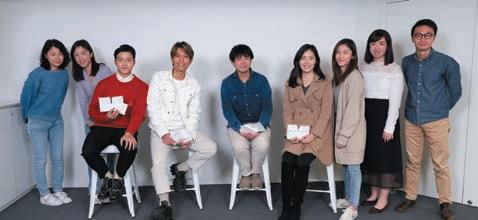
Online shopping has long been the norm, not only in Hong Kong but around the world, especially among young people. So how can we facilitate young entrepreneurs who want to make the most of the trend to grow their own businesses?
Instagram is one of the most popular social media platforms in the world of today. It has a vast user base and doubles as an excellent platform where businesses can showcase products and services to a broad audience. So, until April 2021, young people are heading to the Instagram Academy at the HKFYG's Social Innovation and Youth Business Unit to learn how very effective it can be as a marketing channel with people of all ages.
With the help of the Facebook team, participants are given tips about brand building, broadening a fan base, posting stories and placing advertisements. Instagram also offers a plethora of targeting options. The young entrepreneurs also meet famous Hong Kong opinion leaders and successful Instagram entrepreneurs who share their own business journey stories.
Thanks to its parent company, Facebook, it has access to features like advertising based on age, location, gender, interests, and much more. Building better brand-follower relationships and grasping audience engagement help entrepreneurs make well-informed decisions about content which means turning followers into customers.

The training is virtual and there will be two online business consultation sessions for participants to get and specific advice on their own particular startup ideas. And so far the feedback has been very positive. Asked how useful the programme is for building their knowledge base and sharpening marketing techniques for Instagram, 80% of participants, gave a big thumbs up.
The next step will be to offer placements in selected retail outlets so outstanding participants can put what they have learned into practice and polish online business skills.
More details hkfyg.instagramacademy.hk
Enquiries May Lee 3595 0945
Thank you to Facebook and Instagram! 35
p Facebook and HKFYG representatives enjoy the moment with the successful Instagram entrepreneurs.
Getting ready for transit
This goal-oriented programme helps unemployed and underemployed persons affected by the pandemic with career planning, useful job-search skills and creating opportunities.
Target Up to 100 young people aged 18 or above
Kick-off Webinar 18 December 2020
First quarter 2021 Activities
Career and upskilling webinars
Job-searching, CV and interview workshops
Personal career consultations
Virtual workshop
Lead speakers at kick-off webinar: December 2020
Kathy Ho Senior Customer Success Manager, LinkedIn
Francis Ngai Founder & CEO, SVhk
Alice Lui Deputy Executive Director, HKFYG
With:
CK Lee Founder & Managing Director
C.K. Lee & Associates and former Chairman
Human Capital Management Society, HKMA
Sandy Leung Co-Owner & Manager
Talent Acquisition & Branding, HKBN
Olmen Chu Yoga Instructor, former Cathay Pacific air crew
Moderated by Steven Tsoi Chief Impact Evangelist, SVhk
Always be ready to take a CHANCE
C: Change your mindset
H Stay good Humoured
A: Appreciate others
N: Build Networks

C: Increase your Competences
E: Equip yourself with skills
More details yen.hkfyg.org.hk/careertransit
Enquiries Angie Lam or Rennie Wong 3113 7999
Co-organized by SVhk (Social Ventures Hong Kong), HKFYG and LinkedIn
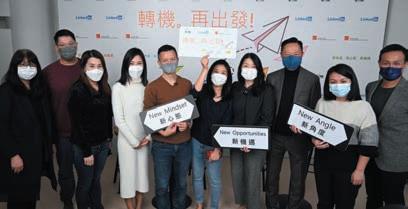
Key tips
Enjoy new beginnings
Start doing things you couldn't do in the past
Find your purpose
Try to understand your potential
Do something meaningful
Learn transferable skills and close the skills gap
Recognize that job searching means soul-searching
“Spend time setting your career goals, research potential opportunities and expand your network proactively. Your destination will then slowly come into view.”
Kathy Ho Senior Customer Success Manager, LinkedIn
Young participants say
“The webinar inspired and encouraged me. This is a good time to do something new, like volunteer work or learning different skills. All this is possible because I don’t have a job that occupies all my time.”
“These are hard times. Thank you for giving us this meaningful support.”
“I have learned so much more about the needs of the market and how to equip myself to find a new job.”
March 2021 ∣ Youth Hong Kong HKFYG Services 36
p centre: Kathy Ho (LinkedIN) and Francis Ngai (SVhk) with Alice Lui and other staff from HKFYG
Youth unemployment and job training overseas
and Hong Kong
During the pandemic, remote work is taking place everywhere, many jobs have already been lost and youth unemployment has risen sharply around the world. Internships have been in short supply in countries where there is usually a plentiful supply. As restrictions ease, students looking for placements will need digital job skills and adaptability to attract hirers in a very competitive market.
Entire industries and job roles have been turned inside out as a result of COVID-19. Learning new skills that will stay relevant for future work is now the key for young people starting out in careers. Finding potential employers that offer internships, apprenticeships and professional development training is a good first step. Hong Kong matches the UK and Australia in its youth unemployment rate but other parts of the world are suffering even worse.
Against a gloomy background, new jobs are nevertheless emerging because dynamic entrepreneurs are finding ways to optimize the power of technology. While technology deletes some jobs, it creates new ones elsewhere and the rate of technological innovation has picked up while the use of digital tools has increased because of social distancing protocols.
Nevertheless, one of the biggest disconnects today is between the academic world and world of industry. This generates many problems for both employees and employers and the gaps in technical and soft skills needed and those of applicants have widened. International business has taken this on board and companies doing campus recruiting and hiring after internships incorporate both generic and job-specific skills in their programmes.

Spain
Males: 39%
Females: 42.7% [highest in the OECD]
Hong Kong Males and females: 16.5% [15-19-year-olds] 16.6% [20-24-year-olds]
UK
Males: 16.3%
Females: 12.1%
Australia
Males and females: 15.6%.
US
Males and females: 11.2%
Sources
• data.oecd.org/unemp/youth-unemployment-rate.htm
• censtatd.gov.hk/press_release/pressReleaseDetail.jsp?charsetID=1&pressRID=4824
• upskilled.edu.au/skillstalk/youth-unemployment-australia
• statista.com/statistics/217448/seasonally-adjustedmonthly-youth-unemployment-rate-in-the-us/
37
Youth unemployment: 15–24-year-olds
Where to look
Big general employment agencies such as LinkedIn, JobsDB, Glassdoor, Graduate Jobs and Monster are still a good place to look for placements when internships are not built into degree programmes. The highest number of opportunities in 2020 were with tech companies, according to the data from Glassdoor which also showed that Amazon was offering the most internships.1
A few of the many job search engines that specialize in internships include Totaljobs, InvestIn and Milkround in the UK,2 Globalplacement and The Intern Group in Europe, and Indeed, InternshipUSA and Idealist in the US.3 Other, fee-based internship agencies operating internationally include Absolute Internships and Worldwide Internships. The Intern Group offers virtual and domestic internship programmes for applicants from the US, UK, mainland China, Hong Kong, Canada and Australia.
In Hong Kong
The big corporations in Hong Kong have internship and apprenticeship programmes that recruit annually. A specialist virtual internship programme is offered by Foster Worldwide, based in Hong Kong. OnGrad*, a new education technology startup, launched a 6-week unpaid virtual internship programme last year that offered multi-corporate work experience to students in the city who participated in virtual training sessions organized locally.
Half of the Hong Kong students who did internships last year acquired their job experience virtually, according to the Federation’s survey published in late 2020 [See page 48]. However, JIJIS, Hong Kong’s joint universities’ system for collecting statistics on internship vacancies recorded a steep fall in available placements falling from a total of 12,091 at the end of 2019 to 8,297 by the end of 2020.4
In the US
Back in normal times, the American National Association of Colleges and Employers found that 51.7% of students who’d had an internship received at least one job offer.5 Last year, 12% of American employers cancelled or suspended their internship programmes. 71% of them moved to fully virtual internship programmes. 6
One high growth area for graduate recruiting is healthcare, including nurses, doctors, pharmacists, allied health professionals and support personnel. Another, inevitably, is technology. Professional, scientific, and technical services are among the top industries hiring in the US, with increased demand for software/app developers. 7
In the UK
Whereas almost 75% of the UK’s top graduate employers provided paid internships during the 2019 summer vacation, the fall in internships in 2020 was steeper than in either the US or Hong Kong. Placements fell by 64% in the year to May 2020 and graduate recruitment fell in thirteen out of fifteen of the most sought-after industries and business sectors in 2020, including accounting and professional services firms, engineering and industrial companies, and public sector employers.8

A new survey shows that 42% of young people are more likely to consider on the job training and apprenticeships over university study, a third more than before the pandemic.9 Apprentices in the UK are already able to train on-site again. The good news is that half the UK’s leading employers are hoping to be able to deliver inperson vacation work placements and internships in the summer of 2021 and internship experience has been ranked by recruiters as their number one candidate criterion. Apprenticeships are also becoming more popular.
Read more
1. uk.finance.yahoo.com/news/coronavirus-uk-internships-fall-by-64-in-a-year-093338300.html
2. forbes.com/sites/susanadams/2015/01/30/the-10-best-websites-for-finding-an-internship/?sh=143a210d1b44
3. huffpost.com/entry/the-5-best-websites-to-fi_b_2860722
4. JIJIS (Joint Institutions Job Information System for University Grants Committee-funded universities in Hong Kong.) 16 Feb 2021
5. monster.com/career-advice/ar ticle/Internships-Postgraduation
6. media2.vault.com/14339577/2020vaultemployer internshipsreport.pdf
March 2021 ∣ Youth Hong Kong Youth watch 38
US graduates recruited through work experience, by sector or industry
How many new recruits in Big Four companies do internships?
• PwC 83.6%
• EY 83.2%%
• KPMG 82.6%
• Deloitte 82.2%
Source internships.com/career-advice/search/to-intern-or-not-which-companies-require-an-internship
Note
Above figures are for 2019 and are based on US data
7. financesonline.com/career-trends/

80% of the spring 2021 taster programmes for firstyear students are expected to take place online but up to half of the UK’s top employers are expecting to offer in-person course placements as part of university degree courses expected to start in September or October and last up to 12 months.10
Almost three-quarters of graduates joining the top investment banks have been recruited via work experience programmes and at least half those recruited for the leading law firms, banking and finance employers and oil and energy companies have been offered graduate jobs after completing successful work experience. Employers in retail, consulting and the public sector were the leastlikely to recruit graduates through work placements.11
8. ise.org.uk/staff/details.asp?id=23853 and theguardian.com/education/2020/may/18/employers-are-slashing-graduate-jobs-but-students-mustnt-lose-hope
9. theconstructionindex.co.uk/news/view/covid-prompts-youngsters-to-think-again-about-apprenticeships-and-trades
10. markinstyle.co.uk/internship-facts/#Inspirational_Statistics_on_Internships_Editors_Choice
11. highfliers.co.uk/download/2021/graduate_market/GM21-Report.pdf
12. channelnewsasia.com/news/singapore/gover nment-traineeship-programme-covid-19-coronavirus-12672152
13. straitstimes.com/singapore/parenting-education/compulsory-inter nships-for-all-ntu-undergraduates-starting-this-year
Investment Banking Law Banking & Finance Oil & Energy Consumer Goods Engineering & Industrial Chemical & Pharmaceuticals Accounting & Professional Services Technology Media Retail Public Sector Consulting 73% 70% 58% 50% 47% 44% 38% 37% 31% 25% 19% 12% 10%
39
Sources The Graduate Market in 2021
Percentage of entry-level jobs requiring American graduates to do internships
In Singapore
As of February 2020, 37.6% of 14,131 Singaporean higher education students and graduates had done a formal internship with an employer. As in many other countries, universities there are increasingly making internships a mandatory part of degree courses and a new job traineeship programme was launched Singapore last year in response to the pandemic.12
Institutions like the Singapore Management University and the Singapore University of Technology and Design have already made internships compulsory for all students and internships are also a requirement for some National University of Singapore students, including those engineering and computing. The latest to join the trend is Nanyang Technological University (NTU) where all students will need to complete work placements from their second year onwards which counts towards their graduation requirements. These studying can be completed locally or overseas.13
Source internships.com/career-advice/search/to-intern-or-not-which-roles-require-an-internship
Finding internships
American surveys of about 11,000 interns in 2020 found:
• 76.5% of internships were virtual
• 42.6% found their internships through campus recruiting
• 13.9% found them through a company’s website
• 8.6% found placements through professional networking
• 8.4% used friend or family connections
• 12.6% of internships were entirely on site
Sources
• vault.com/blogs/inter nships/100-best-internships-for-2021 yello.co/blog/virtual-internship-statistics/

Law Clerk Audit Associate Reporter Analyst Marketing Specialist Consultant Graphic designer Engineer Research Assistant Paralegal Project Manager Retail Sales Associate Recruiter Accountant Administrative Assistant Customer Service Representative Pharmacy Technician Substitute Teacher Bank Teller Music Teacher Real Estate Agent Special Education Teacher Insurance Agent Elementary School Teacher Systems Administrator Registered Nurse 86.2% 84.5% 81.6% 77.2% 73.7% 67.6% 65.9% 65.7% 63.9% 63.1% 55% 51.4% 50.2% 50.0% 48.9% 38.1% 36.1% 35.4% 34.9% 32.1% 31.6% 30.6% 30.6% 29.5% 28.9% 10.9%
March 2021 ∣ Youth Hong Kong Youth watch 40
Home cooking a hobby and a habit
Neighbourhood First, an HKFYG programme for young volunteers, kicked off its uKitchen scheme to encourage young people to show they care for others by cooking for them. 21 HKFYG Youth SPOTs have uKitchen facilities and young people who sign up learn how to cook from professional chefs and go on to share the delicious dishes they have cooked at gatherings.
What is uKitchen?
it promotes home cooking
enhances kitchen skills
uses cooking as a way to take youth into the community
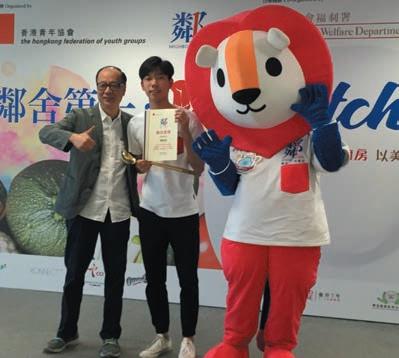
Who’s it for?
beginner cooks
neighbourhood communities
the vulnerable and needy
Young cooks say
“Ever since I was a little boy, I’ve been interested in cooking but I didn’t have the chance to learn from a professional until I joined HKFYG’s uKitchen. That was two years ago when I became a volunteer team member of NeighbourHood First.”

“People have been staying at home so much longer during the pandemic and so they have had far more chance to do family cooking. I feel much more confident to join in after learning some cooking skills at uKitchen.”
“For me, cooking has become both a hobby and a habit, but it is also a way for me show the community I care.”
41
Four vegan favourites
These simple vegan recipes takes an hour or less and includes something for everyone.
Starters Stir-fried Eggplant with Garlic Sauce
Main ingredients
Chinese long eggplant, sliced in
half lengthwise and chopped
Fresh ginger, chopped
Garlic, peeled and minced
Peanut oil
Spring onions, finely chopped diagonally
Chinese dried red chilis, chopped
Sauce ingredients
Soy sauce or to taste
Vegetarian mushroom oyster sauce
2–3
1 tablespoon
4 cloves
1 tablespoon
4
2–3
1 ½ tablespoon
2 tablespoons
Water ¼ cup
Honey
Shaoxing wine or other rice wine
Chinese black vinegar or rice vinegar
Cornstarch
Pure sesame oil
Steps
1. Make the sauce by whisking all the ingredients together in a bowl then leave aside
Beefy mushrooms and broccoli
Main ingredients
Dried shiitake mushrooms
Broccoli florets
Red bell pepper, sliced
Garlic minced or finely chopped
Onion, sliced
1 tablespoon
1 tablespoon
1½ tablespoons
1 tablespoon
1 teaspoon
2. Chop the eggplant then stir-fry with a little oil for a few minutes over medium heat, until tender and then transfer to a bowl
3. Cook the garlic, ginger, and chilli for a minute in the same pan then return the eggplant to the pan
4. Add sauce and scallions then stir-fry quickly with a little sesame oil
5. Check seasoning and serve with steamed or fried rice
Variation: Add jade melon cut into the same size pieces as the eggplant at the same time as the ginger and garlic. Takes just 15 minutes to make!

Molten Chocolate Cake (serves two)

Chocolate, preferably semi-sweet
Unsalted butter
Egg and egg yolk
Sugar [to taste]
45g
4 tablespoons
1 each
1 or 2 tablespoons
Vanilla extract ¼ teaspoon
Low-gluten or gluten-free flour
2 tablespoons
10
2 cups (250g)
1 small
4 cloves
½ medium size
Vegetable broth or water from soaking mushrooms ¼ cup
Sauce ingredients
Soy sauce or to taste
Vegetarian mushroom oyster sauce
1½ tablespoons
2 tablespoons
Water ¼ cup
Honey
Shaoxing wine or other rice wine
Chinese black vinegar or rice vinegar
Cornstarch
Pure sesame oil
Steps
1 tablespoon
1 tablespoon
1½ tablespoons
1 tablespoon
1 teaspoon
1. Soak mushrooms in hot water for 12-15 minutes. Squeeze out excess liquid from each, slice into 1/4-inch-thick strips and save the soaking water
2. Mix all the sauce ingredients together except cornstarch and set aside
3. Heat canola oil in a non-stick pan and sauté onions and garlic until tender
4. Add mushrooms and cook for 10 minutes
5. Add broccoli florets and bell pepper
6. Pour mushroom soaking liquid into pan
7. Sauté for a few more minutes
8. Stir the sauce ingredients well and then add cornstarch mixed with a little water
9. Pour this sauce over the vegetables, stir well and simmer until the sauce has thickened
10. Season to taste

Steps
1. Heat oven to 220C (200C for fan oven) and preheat 2 ramekins on a baking tray
2. Melt the butter and chocolate in the microwave in 30 second pulses, stirring after each pulse until it is smooth
3. Mix the sugar and egg into the flour
4. Beat the egg yolk until thick ribbons form, about 3 minutes
5. Add sugar to taste
6. Fold the flour into this mixture
7. Add mixture to chocolate and unsalted butter
8. Divide between the ramekins and bake 10 minutes or until the cakes have puffed up and look well done. If you underbake, the centre of the cake will pour out of its top when you invert it
9. Let stand for one minute then invert onto plates
10. Serve with ice cream or whipped cream, Cointreau or Amaretto
42
Much More Than Sport
HKFYG is as keen as ever to bring out the best in young people, despite the pandemic and there has been much creative spirit behind new initiatives to get youngsters up, out and active. Two current events paint the picture.
Let's Sportsor with Hang Lung Properties Build Up your Sports Mileage

Sports Mileage gets everyone on their feet and for all of the month of April this year anyone aged six upwards can take part in this special effort to build up miles and reduce stress.

Funded by HKFYG Jockey Club Youth Sports Development Project, the challenge is to register every hour of sports involvement and build up a Sports Mileage record. Every 50 hours of sport counts for 1,000 points and every 1,000 points will give a deprived youngster a free four-hour sports class.
9-minute run online challenge: 1-30 April 2021
During the pandemic, free Sports Mileage classes were given online classes so that children could take a break from studying and discover the joy of sport and exercise. Now, to build participation, HKFYG’s Community Team Sports unit is launching a free 9-minute run online challenge both for them and for anyone who wats to take part. You can run anytime, anywhere to fulfill the 9-minute challenge. You might also win a prize!
Every minute of your run will change the world of a Hong Kong kid
Enquiries Heidi Chan 3611 6670
More details facebook.com/CommunityTeamSports
Sponsor and partner The Hong Kong Jockey Club Charities Trust
Let's Sportsor with Hang Lung Properties
“Let’s Sportsor” brings together over 90 members of staff from Hang Lung Properties to get up and complete 1,000 hours of exercise. All their efforts are now being converted into sponsored sports classes.
Roller skating, gymnastics, soccer, table tennis or rope skipping all on offer
Target Over 100 children from deprived groups
Benefits Each child gets six free sessions including nine hours of training
Location Communities in various districts
Training Ongoing until May 2021
Events Continues until July 2021
Organized by HKFYG Community Team Sports Unit & Hang Lung “As One” Volunteer Team
More details cts.hkfyg.org.hk
Enquiries Lily Tse 3611 6670
Sponsored by Hang Lung Properties
43
The HKFYG English Public Speaking Contest
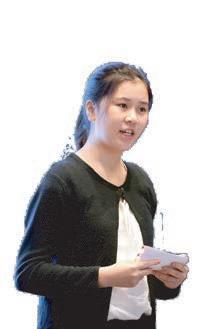
2021
Effective communication is particularly critical during times of crisis. In the midst of a pandemic, this year’s HKFYG English Public Speaking Contest provided a different kind of learning experience for students. The Contest, of which most rounds have been moved online, trains the young participants to communicate effectively and maintain digital competencies. As always, its aim was to encourage self-improvement and build secondary school students’ confidence in their ability to communicate well in English.
2021 Participants
1,132 contestants from more than 105 secondary schools
Junior Division: Secondary 1-3
Senior Division Secondary 4-6
Warming up December – January
Intensive pre-contest training course in 3 sessions
§ Intermediate to advanced public speaking techniques
§ Tips on preparing for an online contest
§ Skills and techniques such as adding spice to your topic and speech
§ Impromptu public speaking exercises
§ Analysis of winning speeches and performances

Train-the-Trainers Workshop for Teachers
§ How to incorporate public speaking-related training with day-to-day teaching
§ How to address common challenges facing second language students of English
§ How to spark interest and counteract lack of confidence
Complimentary Public Speaking Webinar 1
§ Delivered by senior Sir Ti Liang Yang English Language Ambassadors

§ Designed to introduce fundamental public speaking techniques
§ Finding the right topic and concluding a speech well
Complimentary Public Speaking Webinar 2
§ Delivered by professional award-winning public speaking coach

§ Introducing intermediate-level public speaking techniques
§ Non-verbal communication skills and establishing personal speaking style
Winners-to-Winners Sharing Session
§ Co-hosted by 2020 contest winners

§ Getting ready for the contest
§ Speech-making tips: the personal touch, mental rehearsals, etc
March 2021 ∣ Youth Hong Kong HKFYG 44
Feedback from 2021 Grand Finalists
Senior Division

Ng Yuet-hei Good Hope School
I thought I was a poor speaker but this contest gave me an enormous selfconfidence boost and I am genuinely grateful.
Judges
• Professor Timothy Tong Council Member, HKFYG
• Mrs Margaret Leung Chairman, Executive Committee, The English-Speaking Union (HK)


• Mr Jeff Streeter Director, British Council, Hong Kong
• Dr Jose Lai Director, English Language Teaching Unit, The Chinese University of Hong Kong

• Professor Stuart Christie Head, Department of English Language and Literature, Hong Kong Baptist University
Question Masters
I am more aware of my abilities because of the Contest and would like to thank HKFYG for helping me.
Junior Division
Vijay Sathappan Narayanan Island School

The experience has helped me improve my skills and see the world from a different perspective.
• Mr Jeff Nankivell Consul General, Consulate General of Canada in Hong Kong & Macao
• Mr Gavin McDougall Director, Public Affairs, Australian Consulate-General Hong Kong
Contest Trainers
• Mr Brian Wong is a 2020 Rhodes Scholar, a University of Oxford postgraduate and current Director of Training for the Oxford Union and Coach for the Yale Debate Association.
• Mr Jason Chan is a University of Hong Kong Master’s student and member of the University’s English Debating Team.
Prizes
Mark Lee Jin-kang Diocesan Boys' School

The competition has helped me mature as a speaker and is a must-go event for any aspiring public speaker.
Champion Book vouchers valued at HK$1,800 plus the chance to represent Hong Kong at overseas competitions
1st Runner-up Book vouchers valued at HK$1,200 plus the chance to represent Hong Kong at overseas competitions
2nd Runner-up Book vouchers valued at HK$600 plus scholarships for HKFYG Leadership Institute Moot Court Summer School, Summer School for Global Leadership and other designated programmes
Organisations
Supporting
Yau Yeuk-laam HKCCCU Logos Academy
Organized by The HKFYG Leadership Institute Enquiries SC@leadershipinstitute.hk / (852) 2169 0255 / Sharyn NG More details leadershipinstitute.hk/eps 45
Teeing-off: Charity Golf Tournament
HKFYG’s very own golf tournament is raising funds so that all young people can take part in sports.
Venue The Clearwater Bay Golf & Country Club’s 18-hole golf course
Game Format Double Peoria Handicap Stroke Play
Raising funds for disadvantaged youth in HKFYG sports programmes
Annually we reach out to over 3,000 young people with various sports. We can see the benefits to their physical and mental wellbeing so we know we are on the right track. Our purpose is to give those from less privileged backgrounds an opportunity to join in at a minimal cost, supported by our partners.
Have a day full of fun and relaxation with your friends and other players
§ Maximum 4 players each team
§ Individual players will be grouped into teams by the organizer
§ Professional players and coaches are eligible for team competitions only
§ Children aged under 18 should be accompanied by an adult player
§ Entry fee HK$3,800 each or HK$28,000 per team
Please join us for this meaningful event as a patron or sponsor Programmes for youth include basketball, football, rope skipping and running in groups, as well as rugby, ice hockey, lacrosse, dodgeball and many others with training, leagues, competitions and service to the communities. Play golf with us and your support will keep us going!
With many thanks to The Clearwater Bay Golf & Country Club
§ Venue sponsorship
§ Green fee waivers


§ Golf cart waivers
§ Complimentary lunch and dinne
Note on dress Special tournament polo shirts will be provided for players
More details partnership.hkfyg.org.hk/golf2021
46
Run for Wellness 2021
Dates 1 to 14 April 2021
A year on and the pandemic continues to sweep across the world. It’s no wonder that nearly everyone feels pandemic fatigue: emotional, physical and mental burn-out. What can we do? Our plan is to “Run for Wellness.” A virtual event this year, it’s going to be the best way yet to banish the blues!
Open to everyone
Theme Run to Explore & Connect
Where and when Anytime, anywhere

How Runners map out their own routes, distances and locations.
Featuring
Ø Encouraging the community to adopt a healthy lifestyle with regular runs
Ø Celebrities and athletes sharing favourite wellness routes
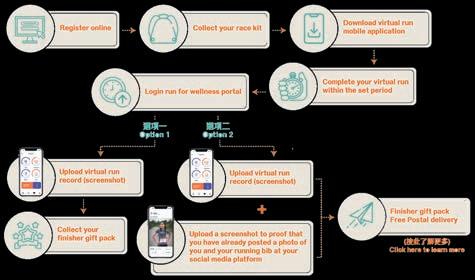
Ø Raising awareness about young people's emotional well-being
Ø All participants carrying a backpack, symbolizing their share of young people's burdens
Distances: run one, two or three!

Ø 2km a happy, relaxed “hygge” journey
Ø 5km a moderate adventure challenge
Ø 10km a self-healing longer journey

Target participants 1,500
Supported by HSBC The event is open to the public under the umbrella of HKFYG’s “Project STEP.” This is a preventive and remedial programme that looks after young people’s emotional wellness. It’s multifaceted and aims to build selfesteem and a positive, caring spirit among youth.
Souvenirs and gifts
Finisher medals & wellness gift packs for each category
For all participants who complete the virtual run according to the organizer’s regulations within the set time
Finisher wellness gift packs include: reusable sport mask, maskmate case, foot spa salt, customized finishers’ medals and tea bags
Trophies and sport gifts for:


§ Top Fundraising Award (Individual / School / Corporate)
Individual / School / Company with the highest amount of donations
§ Top Distance Award (School / Corporate)
School / Company with the most distance run
Enquiries info@runforwellness.org.hk
More details
runforwellness.org.hk
Feedback from past participants
Jason Yeung, a current Hong Kong Athletic Team representative, discovered his potential as a runner after becoming the champion in the 2017 Run For Wellness
Watch his sharing runforwellness.org.hk/2021-wellnesszone
Eddy and Thompson joined as a team in a “Running Buddy Programme” in the 2019 Run for Wellness, even though one of them was good at long runs while the other was keen on short runs. They practiced together, shared feelings of ups and downs in daily life, became friends rather than running peers.
Watch his sharing https://www.runforwellness.org.hk/2021-wellnesszone
Please donate
Fundraising All proceeds will go towards providing financial assistance for underprivileged young people who need timely psychiatric services.
Please go to HKFYG e-giving platform
Supported by HSBC

Enriching Internship
Internship is important for any university student who wants to gain work experience and job skills before joining the workforce. However, against the background of COVID-19 there has been a sharp fall in work placements and the implementation of government work-from home restrictions has led to the rise of virtual internships.

A group of young people who did virtual internships were interviewed separately. They said the difficulties they faced during virtual internships included little chance to experience a real work environment and culture, ineffective communication and lack of access to resources for learning job skills.
An expert in careers from the higher education sector who was interviewed pointed out that internships could adopt a hybrid mode and that it was important to learn and work both virtually and face-to-face, in line with current trends and the demands of industry.
Comments from Youth I.D.E.A.S. think tank members
Dan Cheung, group convenor “I suggest that schools and NGOs provide other practical learning opportunities apart from internships that involve technology and problem-solving. This could allow students to apply what they have learned in real-life settings. Second, students need training in virtual internship and other skills in order to adapt to the changing working environment. Third, NGOs could develop virtual internship platforms which provide information and matching services.”
Key points from respondents
● 60.7% students thought internships could be 10%-30% virtual.
● 48% had done no internship.
● 20.7% of these had their internships cancelled or postponed.
● 27.3% failed to find an internship.
● 19% wanted internships to be 100% face-to-face.
Among the students whose internships went ahead, 54.3% had only virtual internships.
74.2% of these thought it could increase flexibility.
65.3% thought the virtual mode could save money and time.
48.4% said it allowed them keep abreast of digital trends.
Report No.55 HKFYG Youth I.D.E.A.S. Education group
Bosco Leung, group member “Businesses and organizations can set up an internship protocol and offer information kits for interns to learn about the nature and background of jobs. Companies could also launch a virtual intern buddy support scheme to introduce company culture to students and allow them to get in touch with colleagues. They can also hold online sessions where interns share their knowledge and strengths with others. Two-way communication during virtual internship is indispensable.”
Derek Lee, group member “The government could extend the current overseas internship subsidy scheme to include overseas virtual internships. This would create more opportunities for students to widen their horizons and equip themselves with the various skills needed to face future challenges.”
Published title Enriching Students' Internship Experiences in the Next Normal
Respondents 877 university students who intended to be interns in 2020 were surveyed. 21 students and 5 experts were also interviewed.
More details [in Chinese] yrc.hkfyg.org.hk/2020/11/30/yi055/
Enquiries Vivian Yeung 3755 7038
48
There was a 30% drop in the availability of internship opportunities in 2020 and the pandemic continues to affect students’ plans. This report explores ways of enriching the experience of student interns when many career plans are on hold.
Lessons for Public Health from COVID-19
The COVID-19 pandemic is a huge threat to public health everywhere. Although Hong Kong residents are very aware of the importance of maintaining personal hygiene, many have pandemic fatigue and hope that vaccination will end the fight against the virus.
Young people complained of low morale as a result of staying at home so long. A psychiatrist commented that the length and nature of the pandemic, compounded by strict control measures, had resulted in a build-up of stress and lack of motivation to fight the virus although 20.2% of respondents had initiated some form of community-led activity to fight COVID-19.
Key points from respondents
Survey respondents were generally dissatisfied with government measures in response to the pandemic, rating them at 4.82 on a 0-10 scale.
● 73.8% were unwilling to use the government’s “LeaveHomeSafe” contact tracing app.
● 73.4% had experienced pandemic fatigue.
● 67.7% wanted to take part in the government vaccination programme.
● 48.1% said their willingness to be vaccinated was most affected by vaccine safety profiles.*
● 43.7% thought that government measures were too lax.
79.2% thought that border controls were the most inefficient measure.
53.8% thought quarantine measures were the most efficient.
● When asked about inconvenience:
56.5% agreed that restrictions on restaurants, businesses and other premises were the most inconvenient.
40.2% thought prohibition of group gatherings in public places was the most troublesome.
Report No.56 HKFYG Youth I.D.E.A.S.
Livelihood group
Published title Public Health Lessons Learnt from the COVID-19
Ronald Chan, group convenor “Research shows that public concerns about vaccine safety profiles will have a huge impact on vaccination rates and efficiency The authorities should enhance public education about the vaccinations in collaboration with district councils and NGOs.”
Alvin Kan, group member “The government should establish a detailed track and trace system with public alerts, an action plan, risk assessments and guidelines on infection control measures. These have been used effectively elsewhere and can help enterprises organize their operations with more certainty.”
Annette Ng, group member “An integrated electronic system combining the government’s “eHealth” and “iAM Smart”** platforms with COVID-19 testing and vaccination records would give better control and could provide a solid foundation for future primary care expansion.”
Jewel Ho and Wisely Ngai, group members “Concerns about privacy have led to widespread reluctance to use the mobile app, “LeaveHomeSafe.” The developer and government department responsible should get an independent privacy assessment and an information security audit Human resources devoted to quarantine monitoring should be unified and the “StayHomeSafe” mobile app for those undergoing home quarantine should be improved.”
Participants/respondents 806 Hong Kong residents aged 18-65. 20 young interviewees, two managers of volunteer services, a psychiatrist, a health education professional and a pathologist were interviewed.
More details [in Chinese] yrc.hkfyg.org.hk/2021/01/11/yi056/
Enquiries Adam Choi 3755 7042
* Also see scmp.com/news/hong-kong/health-environment/article/3116265/ about-40-cent-hong-kongs-young-people-averse scmp.com/news/hong-kong/health-environment/article/3119968/ hong-kong-residents-remain-wary-covid-19-vaccines
** Government platforms: eHealth ehealth.gov.hk/en/index.html
iamsmart.gov.hk/en/faq.html

49
This study looks at views on the government’s handling of the pandemic and ways to encourage people to keep fighting COVID-19 by improving public health literacy.
To Stay or To Leave?
Many social and personal factors contribute to the propensity to stay or leave one’s home town. Whatever tips the balance, confidence in the likelihood of a stable or more prosperous future is important and good governance plays a significant role.
Key points from respondents
● 91.8% agree that they have a sense of belonging to Hong Kong.
● 83.8% say they want to make a contribution to the city.
● 56.0% have hopes for Hong Kong's future.
● 43.6% are without hope for the city’s future.
Emigration decisions
For:
● 28.6% of the total respondents have a plan to emigrate. The three most common factors for leaving that are socially rather than personally determined are:
The enactment of the National Security Law in Hong Kong (50.7%).
The disappointing performance of the SAR Government (49.3%).
The serious rifts in society (31.3%).
Against:
● 65.5% of the total respondents have no plans to emigrate. The three most common factors for staying that are socially rather than personally determined are:
Life in the city is convenient (45.1%).
Good public security (29.4%).
Development opportunities are still available (17.7%).
Key points from individual youth interviews
17 youth were asked individually about their plans. Eight chose to emigrate overseas. Nine chose to stay.
Reasons for considering emigration:

There is little space for diversified development in HK.
The quality of life in the city is deteriorating.
They have lost the hope in the chance of their views being heard by the SAR government.
Hopes for Hong Kong’s future:
Aspirations to take part in voluntary work at district level where professional knowledge or talent might be useful for improving Hong Kong.
Enduring hopes for more direct, fruitful dialogue on policy with the government.
Comments from Youth I.D.E.A.S. think tank members
Vivian Leung, group member “The underlying problems are very complex and there can be no quick fix or shortcut solution to big issues like governance or rebuilding hope. However, perhaps a government campaign collecting views from youth about their dreams for Hong Kong in ten years’ time might help to provide a sense of potential empowerment and suggest that they might have a role to play in building a future society together.”
Report No.57 HKFYG Youth I.D.E.A.S. Governance group
Published title To Stay or To Leave? A critical question for good governance
Survey respondents 525 young people aged 18-34
Parallel interviews with 17 youth and five experts or academics
More details [in Chinese] yrc.hkfyg.org. hk/2021/02/01/yi057/
Enquiries Sharon Cheung 3755 7039
Tony Tsui, group member “We recommend the setting up of a high-level centralized government mechanism for handling public opinion. This might allow principal officials to understand public sentiment better at a time when social issues have become complicated. In the long run this could reduce the risk of public grievances accumulating.”
Ada Li, group member “The government should grasp every opportunity to communicate with young people. Only by reaching out and communicating effectively can they hope to pave the way towards rebuilding mutual trust. Talking and listening on both sides are fundamental if we are to make even a single step forward.”
The freedom to emigrate and immigrate have always been treasured in Hong Kong. In the context of recent social and political unrest, over 28% of young people have plans to leave.
50
HKFYG 2021-22 annual plan
continuous engagement with stakeholders our commitment and our pledge
The publication of our Annual Plan for 2021-22 is imminent and we would like to thank all our stakeholders for contributing. We began gathering feedback in October last year and are very excited about all the invaluable, creative ideas received so far. Such generous support from partners, young people, staff and senior management makes us feel very fortunate.
We are always very eager to hear from you and a variety of channels are open, online, email, on the phone and ‒ whenever possible ‒ face-to-face:
The needs of youth
An online meeting was organized to gather creative ideas from around 400 staff members of all service units on Development Day last December. Face-to-face meetings were restricted due to COVID-19 but that did not stop us from an enthusiastic brainstorming session about services to meet the needs of young people. In such challenging times as these, they must always come first.
Engaging youth
Young people are invited to give feedback through the lively discussion channel of the Youth Service Advisory Committee, a federation's governance body composed of committed young leaders aged 18-35. Email cp@hkfyg.org.hk

Call Eva Tseung 3755 7088
News and views
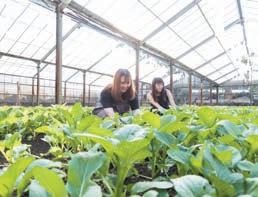
Partners are kept posted about events, projects and progress through our Publications “Youth Matters” e-newsletter, “Youth Hong Kong” magazine. You are warmly invited to get in touch.
Youth Matters email: partnership@hkfyg.org.hk
Youth Hong Kong email: youthhongkong@hkfyg.org.hk Thank
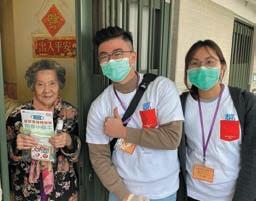
you for your contributions. Please keep them coming!
Publisher :
The Hong Kong Federation of Youth Groups 香港青年協會 hkfyg.org.hk.m21.hk
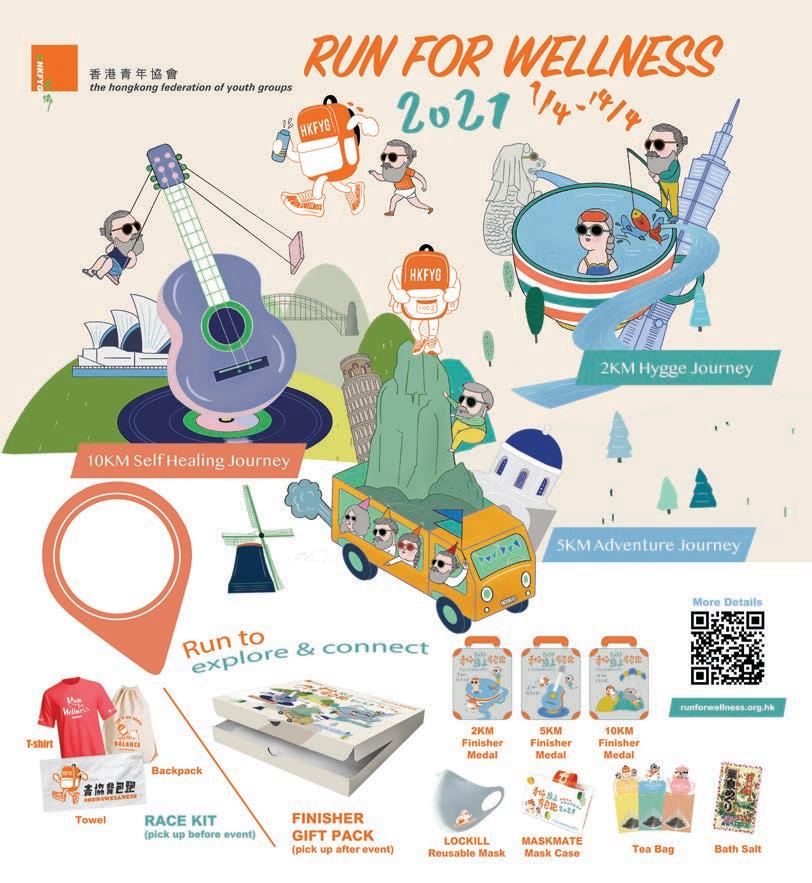
Youth Hong Kong: 21/F, The Hong Kong Federation of Youth Groups Building, 21 Pak Fuk Road, North Point, Hong Kong Tel : 3755 7097 3755 7108 Fax : 3755 7155 Email : youthhongkong@hkfyg.org.hk Website : youthhongkong.hkfyg.org.hk
The title of this journal in Chinese is Xiang Gang Qing Nian 香港青年
Soy-ink is made from soybeans and is both environmentally friendly and sustainable. Soy-ink is biodegradable and non-toxic.
















 * The BBC micro:bit is a pocket-sized computer that introduces students to the ways in which software and hardware work together. It has an LED light display, buttons, sensors and many input and output features that can be programmed.
** CPS is a collaborative problem-solving system created by HKFYG’s Centre for Creative Science and Technology for online collaborative training and exchange of innovative ideas among students regardless of location. The system has been renamed “Co-solve.”
* The BBC micro:bit is a pocket-sized computer that introduces students to the ways in which software and hardware work together. It has an LED light display, buttons, sensors and many input and output features that can be programmed.
** CPS is a collaborative problem-solving system created by HKFYG’s Centre for Creative Science and Technology for online collaborative training and exchange of innovative ideas among students regardless of location. The system has been renamed “Co-solve.”

































 Peter Fu
Peter Fu

 More than mastering coding Angel Woo
More than mastering coding Angel Woo






 Hatch, a co-working factory, one of SVhk's social enterprises.
Hatch, a co-working factory, one of SVhk's social enterprises.














































